#American Restaurant Association
Text
SoCal Gas spent millions on astroturf ops to fight climate rules
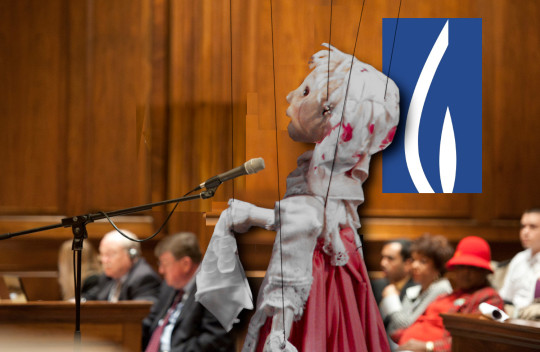
Today (19 Aug), I'm appearing at the San Diego Union-Tribune Festival of Books. I'm on a 2:30PM panel called "Return From Retirement," followed by a signing:
https://www.sandiegouniontribune.com/festivalofbooks

It's a breathtaking fraud: SoCal Gas, the largest gas company in America, spent millions secretly paying people to oppose California environmental regulations, then illegally stuck its customers with the bill. We Californians were forced to pay to lobby against our own survival:
https://www.sacbee.com/news/politics-government/capitol-alert/article277266828.html
The criminal scheme is spelled out in eye-watering detail in a superb investigative report by Joe Rubin and Ari Plachta for the Sacramento Bee, which names the law firms and individual lawyers involved in the scam.
Here's the situation: SoCal Gas is California's private, regulated gas monopoly. They are allowed to lobby, but are legally required to charge their lobbying activities to their shareholders, and are prohibited from raising customer rates to pay for lobbying.
The company spent years secretly violating this rule, in the sleaziest way possible: working with corporate cartels like the California Restaurant Association and BizFed, the monopoly paid BigLaw white-shoe firms to procure people who posed as concerned citizens in order to oppose climate regulations that are essential to the state's very survival.
The bill topped $36 million – and it was illegally charged to its customers, the Californians whose immediate health and long-term survival these efforts opposed. SoCal Gas refuses to disclose the full extent of the spending, as do its lawyer-procurers, who cite legal confidentiality and a First Amendment right to secretly seek to influence policy in their refusal to disclose their profits from this illegal conduct.
The law firms involved are a who's-who of California's most prominent corporate fixers, including Reichman Jorgensen and Holland & Knight. The partners involved have a long rap sheet for anti-climate dirty tricking, most notably Jennifer Hernandez, notorious in climate justice history for an incident where activists claim she posed as one of them, infiltrating a campaign to force corporate despoilers to clean up their pollution in order to sabotage it, while secretly on a wealthy, prominent landowner's payroll.
Hernandez claims to care about the environment and says that her longstanding, corporate-funded, extensive campaigns and lawsuits against state environmental regulations are motivated by concern over their impact on working people. Her firm, Holland & Knight, denies serving SoCal Gas in opposing gas regulations, but it received $594k in ratepayer dollars, and submitted comments opposing the rules on its own behalf. Those comments were nearly identical to the comments submitted by SoCal Gas.
Hernandez also represents an obscure organization called The Two Hundred for Home Ownership in "a flurry of lawsuits" over California Air Resources Board rules on pollution, seeking to overturn the state's landmark climate change regulations.
Two Hundred for Home Ownership was founded by Robert Apodaca, who told the Bee that Hernandez's work for him is pro bono and not funded by SoCal Gas, but his entry into the fray occurred just as SoCalGas was founding an astroturf group called Californians for Fair and Balanced Energy (C4BES), which pretended to be an independent organization, disguising its relationship with SoCal Gas.
Apodaca is also founder of United Latinos Vote, an organization that had been largely dormant for seven years, not receiving any donations, until 2018, when the California Building Industry Association gave it $99k. The CBIA is a large-dollar recipient of donations from SoCal Gas, and its CEO insists that it was not acting on SoCal Gas's behalf when it made its unpredented donation to Apodaca.
The CBIA donation to United Latinos Vote was forerunner to a flood of corporate donations from the likes of Chevron, Marathon and Phillips 66. Shortly after receiving this cash, United Latinos Vote ran a full page ad in the LA Times, accusing the Sierra Club of pushing for anti-gas appliance rules that would harm working class Latino families.
This ad, in turn, featured prominently in advocacy by the SoCal Gas front group C4BES, funded with $29.1m in ratepayer money, which it then spent seeking to link clean appliance rules with anti-Latino racism. A quarter of California's carbon emissions come from home gas use.
SoCal Gas is regulated by the California Public Utility Commission (CPUC), which tolerated this mounting illegal conduct for many years, even as the company circulated internal memos as early as 2015 discussing its plans to oppose electrification in the state on the basis that it constituted "a significant risk to our business."
But last year, CPUC fined SoCal Gas $10m. Now, CPUC's Public Advocate office has filed a damning, extensive report on SoCal Gas's unlawful conduct, seeking $80m in rate cuts to compensate Californians for the funds misappropriated to protect the company's shareholder interests:
https://docs.cpuc.ca.gov/PublishedDocs/Efile/G000/M517/K407/517407314.PDF
Additionally, the Public Advocate is demanding $233m in fines for the company's refusal to allow investigators to audit its books and discover the full extent of the fraud.
SoCal Gas is the nation's largest utility, but (incredibly), it's not the dirtiest. That prize goes to Ohio's FirstEnergy, which handed $60m in ratepayer dollars to state politicians in illegal bribes in exchange for coal and nuclear subsidies and cancellation of state climate rules. That scandal led to GOP speaker of the Ohio House Larry Householder being sentenced to 20 years in prison:
https://en.wikipedia.org/wiki/Ohio_nuclear_bribery_scandal
There is something extraordinarily sleazy about using ratepayers' own money to lobby against their interests. SoCal Gas and its Big Law enablers have funneled millions in Californian's money into campaigns to poison us and boil us alive, and they did it while using workers and racialized people as human shields.

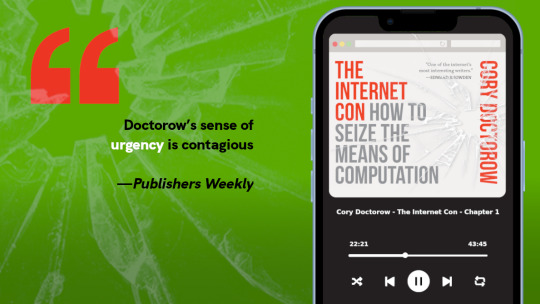
I'm kickstarting the audiobook for "The Internet Con: How To Seize the Means of Computation," a Big Tech disassembly manual to disenshittify the web and make a new, good internet to succeed the old, good internet. It's a DRM-free book, which means Audible won't carry it, so this crowdfunder is essential. Back now to get the audio, Verso hardcover and ebook:
http://seizethemeansofcomputation.org

If you'd like an essay-formatted version of this post to read or share, here's a link to it on pluralistic.net, my surveillance-free, ad-free, tracker-free blog:
https://pluralistic.net/2023/08/19/cooking-the-books-with-gas/#reichman-jorgensen

Image:
Maryland GovPics (modified)
https://www.flickr.com/photos/mdgovpics/6635539089/
Jackie (modified)
https://www.flickr.com/photos/79874304@N00/197532792
CC BY 2.0
https://creativecommons.org/licenses/by/2.0/
#pluralistic#socal gas#california#climate emergency#climate denial#Reichman Jorgensen#california restaurant association#astroturf#Holland and Knight#puc#cpuc#california public utility company#fraud#Alice Walton#bribery#ohio#bizfed#Jennifer Hernandez#American Gas Association#The Two Hundred for Home Ownership#Robert Apodaca#Californians for Fair and Balanced Energy#C4BES#United Latinos Vote#Chevron#Marathon#Phillips 66#sacramento bee#sacbee#Joe Rubin
4K notes
·
View notes
Text
Fast-Food Operator Kills Vacations, Hikes Prices As Calif. Wage Law Kicks in
Anyone feel sorry for Pizza Hut or a family that has enough money to own up to four Fat burger franchises? Here's the juice. If you cannot afford to pay employees a livable wage, sorry, but you have no right to own so many franchises or be a restaurant owner, PERIOD. I worked in that industry for years. NRA, the restaurant industry, never ceases to ask MORE from employees, while finding ways to TAKE more from the same. I even worked on a ship. Salaries went down while the amount of work went up. The whole industry and many others need their asses kicked!
#Pizza Hut and Fatburger#GO FUCK YOURSELVES#Americans Desreve A Raise#NRA#National Restaurant Association#California
0 notes
Note
sorry if this is a dumb question and i understand if you don't want to answer but do you have links to posts explaining why israel isn't an apartheid state? i swear i read posts like that on your blog before but i don't know how to refind them
Israeli Arabs have legal equality with Jews. Same restaurants, same pools, same seats on the bus, same voting rights. I would favorably compare the treatment of Israeli Arabs with that of any minority group in any country on Earth.
The West Bank has a military occupation, with (pretty fast) checkpoints and no right to vote about the government running that military. Military occupations are bad and some of us have been against this particular one for decades. The anti-occupation movement hasn't gotten anywhere, they've just been stuck. Being stuck in a military occupation for X more years doesn't make it apartheid, just like being stuck in a bad marriage for X more years doesn't make you divorced. Meanwhile, the 2020 Abraham Accords showed that multiple Arab states were willing to accept this unchanging status quo and deal with Israel as it is. Those two factors - the stagnant, unchanging nature of the occupation, and the clear loss of interest in the Palestinian cause - combined to have the latest crop of awareness-raising college interns at some shifty NGOs try to force change by abracadabra'ing together a new concept of "apartheid" that exists solely for Israel. And it is working, just like "Christ-killer" and "stabbed Germany in the back" worked.
In 2010, Human Rights Watch published an extremely critical report on Israel's occupation of the West Bank. Dragged them up one wall and down the other. Yet there was no accusation of "apartheid" there. In the report, page 33, they cited a lawsuit by the Association for Civil Rights in Israel that had said it was apartheid for the West Bank military occupation authorities to ban Palestinians from driving on Highway 443 after repeated firebombings / shootings against Israelis. The Israeli High Court ruled that it was inappropriate to ban Palestinians from the road, and it re-established their equal driving access - they have had it ever since. The court also said that the accusation of apartheid behind that now-ended ban was dishonest, because the security concerns were not based on race; there were and are no "Jewish-only" roads anywhere, even when WB Palestinians were denied road access, Israeli Arabs could and did drive there. The HRW 2010 report included a long summary of that finding, without challenge. As bad as they saw Israel, they agreed it wasn't apartheid.
Then in 2020 came the Abraham Accords, so while nothing at all had changed in the administration of the West Bank, in 2021 HRW said it actually was apartheid. It really is that simple. The most famous legal convention banning apartheid specifies that it is race-based. HRW instead went with a different legal convention on apartheid, one that says it could be based on national origin if it involves discrimination among citizens of the same country.... and then they up and added their own twist to that, saying they will consider it apartheid if there is discrimination based on national origin AMONG PEOPLE WHO AREN'T CITIZENS OF THE SAME COUNTRY. In a very real sense, HRW declared Mexico is an apartheid state because Americans can't vote in its elections.
In 2022, Amnesty International followed with their own report, saying that not only was the military occupation now "apartheid," but that Israel itself had been an apartheid state ever since it was established in 1948. This moral perversion had the effect of saying Israel literally INVENTED apartheid since in May 1948 it didn't even exist in South Africa yet. It also said that Amnesty International - founded 1961 - had been looking at an apartheid the whole time but never recognized it. To make things even more dishonest, Amnesty said they "are not claiming Israeli conditions are analogous to South Africa," meaning anything that shows how Israel is different from South Africa doesn't count. They're using the South African word for the South African policy but it's actually not like South Africa at all so be quiet, neener neener no backsies.
I shouldn't have to take that seriously. Neither should anyone. Palestinians and their advocates should be ashamed to have to lean on such an obvious bad-faith lie.
Nelson Mandela, who died in 2013, never once accused Israel of apartheid, and instead repeatedly said he supported Zionism and a 2-state solution. Mandela's lawyer, still alive, says the accusation is a lie. Mansour Abbas, leader of the Arab Islamist party that joined Israel's governing coalition in 2021, says the accusation is a lie. And if people want to bandy around NGO business cards, here is the International Committee of the Red Cross in 2017:
“The Red Cross was very familiar with the regime that prevailed in South Africa during the apartheid period, and we are responding to all those who raise their claim of apartheid against Israel: No, there is no apartheid here, no regime of superiority of race, of denial of basic human rights to a group of people because of their alleged racial inferiority. There is a bloody national conflict, whose most prominent and tragic characteristic is its continuation over the years, decades-long, and there is a state of occupation. Not apartheid.”
There's a lot more you can see about the shifty terminology, unreliable sourcing, and longstanding culture of antisemitism and racism within Amnesty International. People who can cite chapter and verse of why the Salvation Army, Autism Speaks, Chik-Fil-A and Harry Potter are problematic should not be shocked.
#israel#palestine#amnesty international#apartheid#antisemitism#leftist antisemitism#false accusations#european antisemitism#jumblr#human rights watch
480 notes
·
View notes
Text
Mary Church Terrell
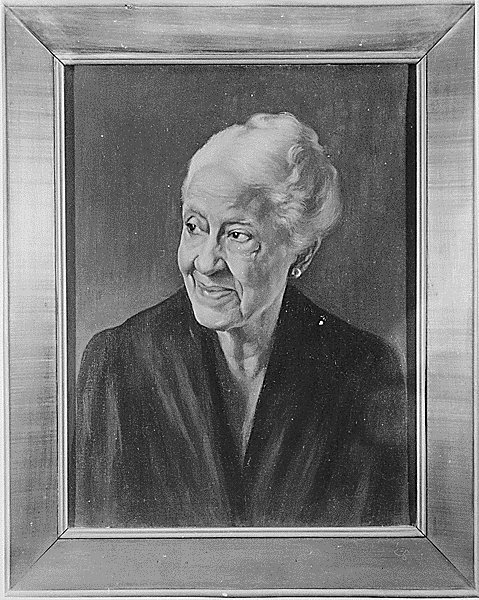
As we celebrate Black History Month, it’s a perfect time to honor the legacy of Mary Church Terrell, a pioneering civil rights and women’s rights activist. Born in Memphis, Tennessee, in 1863, Terrell was among the first African American women to earn a college degree, graduating from Oberlin College. She dedicated her life to fighting for equality and justice, making significant contributions to the suffrage movement and the fight against racial discrimination.
Terell’s commitment to civil rights and women’s suffrage was deeply intertwined with her work in the Black Women’s Club Movement. She served as the first president of the National Association of Colored Women (NACW), which advocated for voting rights and equal rights under the motto “lifting as we climb.” Terrell also played a crucial role in the founding of the National Council of Negro Women (NCNW) and the National Association for the Advancment of Colored People (NAACP).
One of Terrell’s most notable achievements was her involvement in a successful lawsuit in 1950 that led to the desegregation of restaurants in the Washington, DC, area. Terrell’s writings, including “A Colored Woman in a White World,” and “What it means to be Colored in the Capital of the United States,” have left a lasting impact on the struggle for racial and gender equality.
To explore more about Mary Church Terrell’s remarkable life and contributions, the National Archives offers additional resources here:
A Portrait of Mary Church Terrell: A glimpse into the grace and determination of the iconic figure https://www.archives.gov/research/african-americans/individuals/mary-church-terrell
Blogs related to Mary Church Terrell: Delve into detailed articles that explore various aspects of her life and legacy Rediscovering Black History Blog.
https://rediscovering-black-history.blogs.archives.gov/
Unceasing Militant: The Life of Mary Church Terrell with Alison M. Parker: A recorded event that sheds light on Terrell’s multifaceted activism, held on December 17, 2020.
https://www.youtube.com/watch?v=XQYQRKKBr0A&embeds_referring_euri=https%3A%2F%2Fwww.archives.gov%2Fresearch%2Fafrican-americans%2Findividuals%2Fmary-church-terrell&embeds_referring_origin=https%3A%2F%2Fwww.archives.gov&feature=emb_title
External: https://www.linkedin.com/pulse/labor-love-restoration-ledroit-parks-mary-church-ee8xe/?trackingId=V7zIYQZE9YI5JgfRfOS4xg%3D%3D
#national archives#history#nationalarchives#black history month#bhm#african american history#mary church terrell
244 notes
·
View notes
Text
𝗞𝗲𝘁𝘂 𝗗𝗼𝗺𝗶𝗻𝗮𝗻𝘁 𝗧𝗵𝗲𝗺𝗲𝘀 — 𝐍𝐚𝐤𝐬𝐡𝐚𝐭𝐫𝐚 𝐎𝐛𝐬𝐞𝐫𝐯𝐚𝐭𝐢𝐨𝐧 𝐒𝐞𝐫𝐢𝐞𝐬 (part 1) 𝐨𝐟 𝐩𝐚𝐫𝐭 𝟏𝟎
disclaimer: spoilers for all movies or shows mentioned.
the warnings: mentions of drug abuse, sexual violence, self-harm, genocide, mental disorders/illnesses, cannibalism and self amputation.
The most interesting theme within all the Ketu nakshatras was one that was unexpected, as it is common to mainly associate Ketu with concepts of disconnection or isolation from society as a whole -- since Ketu is often linked with the 12H. But it is more about the interactions with the unseen forces within society more than anything. Because the 12H also represents the collective's consciousness and all the interconnected energies that come with that which Ketu becomes possessed by. And it is Ashwini that is the most sensitive Ketu nakshatra, as it easily becomes consumed & absorbed by these 12H energies which often leads to chaos and loneliness.

Ashwini nakshatra embodies Nothingness which is the oldest energy in the universe. It's between a space before actualized creation, and after the rise of awareness that's emerged from Nothingness (or the Cosmic Void). It is very fitting that this is the first nakshatra; but it should also be considered the last as it essentially represents the non-duality of Life & Death. This theme is further extended in Bharani and beautifully explored in that nakshatra, but in Ashwini we focus on the spirit's evolution. The energy found in this nakshatra is as undeveloped as it is chaotic, which is why evolution needs to take place -- and this usually involves extreme harsh forces to tame it. It is in Ashwini where there's confusion or lack of self-awareness of one's own identity as energies here become repressed, unconsciously accumulating. I'm going to use some films as examples to explore this point.
First, I'm going to use the most typical Ketu-coded character. Ashwini Moon Christian Bale's Patrick Bateman in "American Psycho". This film follows an investment banker who relishes in the wealthy excesses of his superficial lifestyle in which everybody else around him also revels in. His life is empty, mostly revolving around getting into exclusive restaurants, wallowing in designer suits, having a meticulous morning routine etc. There's a pressure in general for conformity and Ashwini is sensitive to these energies which they take up, driving them to compete and also go too far with this -- because it's no longer about conforming anymore. It's become an obsession, and these pressures drive Patrick Bateman into homicidal tendencies as an outlet. This film perfectly encapsulates modern-day consumerisms, and it is of course an Ashwini native who is driven into a descent of madness from this empty, superficial culture he's subjected to.
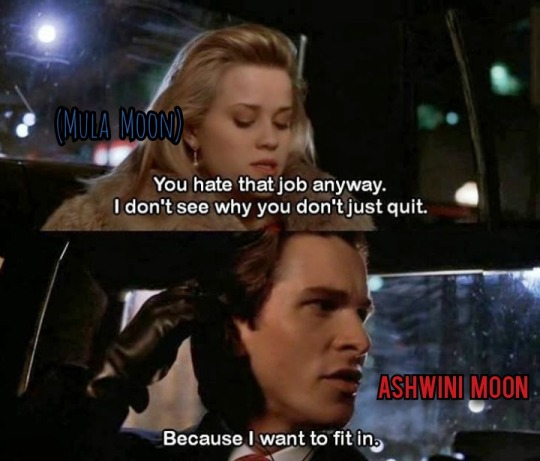
Nothing can fill up the emptiness inside of him and he knows that. This crippling, painful understanding is what continuously manifests his violent self-hatred and hatred towards others. And this is why he is forever trapped in a cycle of loneliness, as he is surrounded by the same narcissistic, self-absorbed suits who will continue to maintain this soulless, superficial culture.
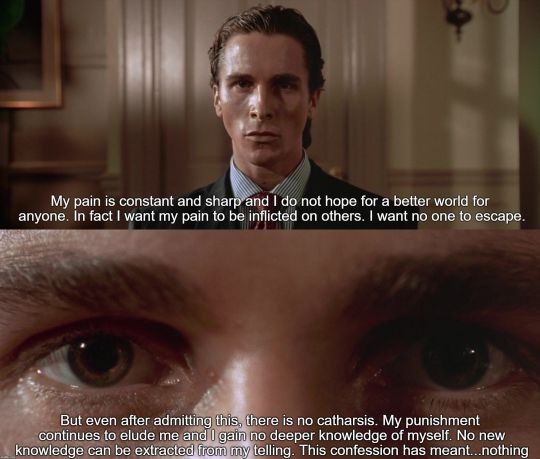
The movie was adapted from the book with the same name, written by Mula Moon Bret Easton Ellis whose own experiences inspired the book "American Psycho".
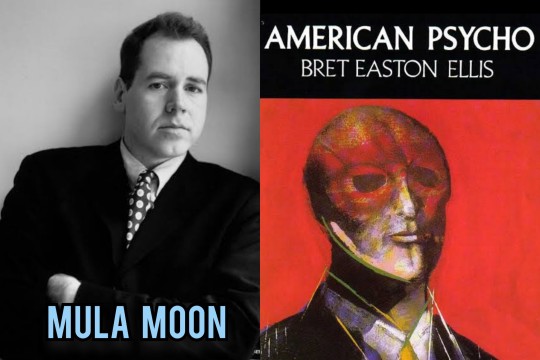
Quote from an interview; OregonLive (2010);
"[Patrick Bateman] did not come out of me sitting down and wanting to write a grand sweeping indictment of yuppie culture. It initiated because my own isolation and alienation at a point in my life. I was living like Patrick Bateman. I was slipping into a consumerist kind of void that was supposed to give me confidence and make me feel good about myself but just made me feel worse and worse and worse about myself. That is where the tension of 'American Psycho' came from... It came from a much more personal place."
-- Mula Moon Bret Easton Ellis
Now, onto the movie "Fight Club", which was directed by Magha Sun David Fincher, and stars Magha Sun Edward Norton and Mula Sun Brad Pitt.

The most highlighted character from this film, played by Brad Pitt, is Tyler Durden, who plans on making a revolution to destroy the hyper-capitalistic, materialistic superficial culture that we saw destroy Patrick Bateman from the inside in "American Psycho".
(video - 🎧)
Of course, just like Ashwini Moon Patrick Bateman took his obsessive consumerism too far; Mula Sun Tyler Durden lays on the opposite spectrum -- aiming to destroy modern society by blowing up all credit card companies and ruining the world's economy. Mula is related to destruction as it is ruled by Nirriti, the goddess of destruction. The oppressive forces that weigh on this Mula character, Tyler Durden, causes him into a spiral for freedom (9H), using extremities and acts of terrorism to be rid of ego/society. Whereas Ashwini, having no solid identity and just being undeveloped in nature, is more likely to conform; but so long as Ketu is there, there will always be an emptiness in the ambitious pursuit of things. Ashwini can grant excess wealth and fame, but with no inner fulfillment or balance, you see characters like Patrick Bateman. Or Daniel Plainview from "There Will Be Blood".
A movie directed by Paul Thomas Anderson who has Ketu in Magha, and stars Ashwini Moon, Mula Ascendant Daniel Day Lewis who portrays Daniel Plainview. Plainview is more Ashwini, as he is an extremely ambitious, capitalistic and competitive oilman.

His pursuit for wealth and power leads him to personal loneliness, isolation and emptiness -- we see how Ketuvians become so drained and eaten alive by the energies they absorb in the pursuit of things. Similarly to Patrick Bateman, he not only hates others but himself and wishes for no one to succeed in life.
(click on the gif(s) if they're buffering lmao, i swear they're cheap)

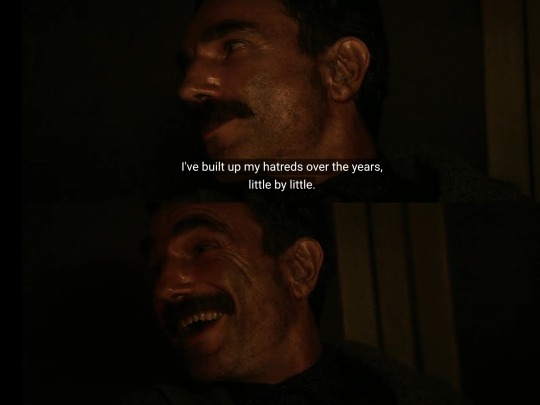
His primal competitiveness and self-loathing even drives away his only family -- his only child. His adult son means to do his own oilrig business and cuts his partnership with him. But Plainview's unchecked ambition shows that even after attaining success and power, he literally goes ahead to disown his own son as he considers him competition now. And now he extends the same hatred he has for others to him. Further isolating himself; this validating his deep sense of loneliness that was always there with his self-loathing.

The film ends in an Ashwini fashion; in which Plainview goes into a psychotic meltdown and murders someone who he has had a long stewing hatred for.
(YouTube clip by me - 🎧)
youtube
I wanted to provide a brilliant video from the YouTuber "The Vile Eye", who explored the dark nature of this character; because it perfectly illustrates Ashwini nakshatra in a twisted way -- especially in how Aries in this segment is influenced by Ketu forces. Everything about this character is every Aries stereotype you can think of from the top of your head, but Ketu exaggerates it to the point of extremity and tragedy.
youtube
Amazing video for anyone who wants to understand Ashwini at its extreme which can manifest in real life of course.
Now in the series "Peaky Blinders", which I quickly wanted to mention, stars Ashwini Moon Cillian Murphy whose character faces moral dilemmas, as his relentless pursuit of power contributes to his moral ambiguity.
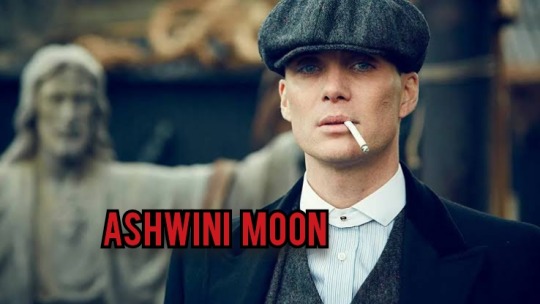
His ruthless ambition to become the most powerful in the criminal underworld is something I couldn't help but relate it back to Ashwini's drive & competitiveness.
The movie "Scarface" stars Ashwini Sun Al Pacino who plays Tony Montana. And fun fact, Tony Montana is loosely based and inspired by the real-life figure, Al Capone, who was literally a goddamn Ashwini Moon. So, I say Scarface is a fucking Ashwini movie.
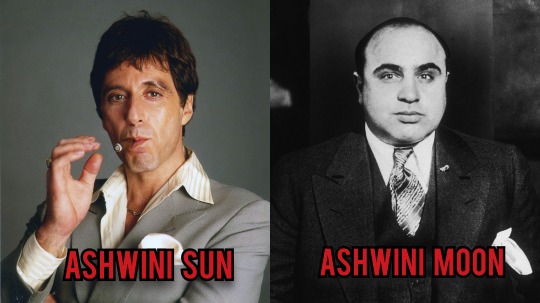
Both Tony Montana and Al Capone had unchecked ambitions and an unrelenting desire for power. In Ashwini, extreme power can be attained, and we saw how Tony Montana quickly rose to it (as Ashwini is the Star of Transport and it is associated with Shidhra Vyapani Shakti which translates to 'The Power to Quickly Reach Things'). Similarly, Al Capone was also driven by the desire for power and he attained it.
Like Daniel Plainview in "There Will Be Blood", Tony Montana starts to experience isolation after all of his achievements. His chaotic behaviour contributes to his alienation, and he starts to feel intensifying loneliness, which seems to be a theme with this nakshatra. And this film also ends in Ashwini fashion; with absolute chaos, the psychotic unraveling of Tony and of course death.
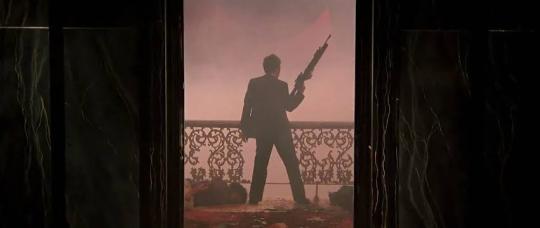
I wanted to also add in the movie "Nightcrawler" which stars Mula Sun Jake Gyllenhaal who plays a character willing to go to the extreme lengths for success and personal achievement, to the point of exploiting others and not giving two fucks about ethical boundaries.

He has a distorted view of success and has an unchecked, ruthless ambition which is common in Ketu nakshatras. He is also a socially isolated character, behaving inappropriately as he is disconnected from social norms. He lacks zero empathy. In his obsessive & relentless pursuit of success, he is devoid of humanity. Had to mention this film because these themes are not exclusive to Ashwini.
But as I did mention, Mula is more likely to be aware of societal pressures and these natives often feel deeply disturbed by them -- while Ashwini is more focused on the Self, as it's ruled by the 1H. In the film "Falling Down", Mula Moon Michael Douglas plays a character who has become disillusioned and is now aware of the pressures and oppression caused by the modern-day life. This movie is literally directed by Magha Sun Joel Schumacher.
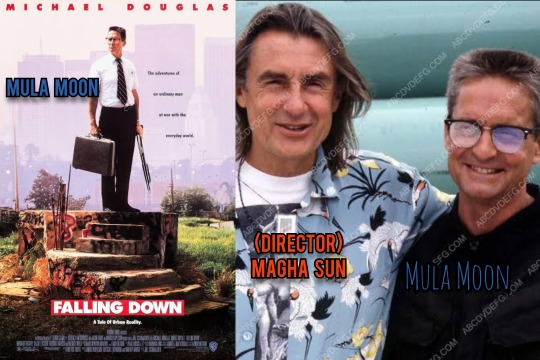
He confronts many issues such as homelessness and crime, which are heavily rooted in the greedy, capitalistic system of modern society. But he becomes violent and chaotic himself, going into a descent to madness (from absorbing the energies felt by the collective who also feel the weight of these oppressive forces within society). This movie deals with the consequences of unchecked rage, a theme shared in all Ketu nakshatras.
The film "Taxi Driver", which stars Magha Sun Robert De Niro and is directed by Magha Ascendant Martin Scorsese, depicts a man who suffers from extreme loneliness, alienation from society, and struggles with existential crisis. The film explores social decay; such as social disparities, the disillusionment of our main character to society's ills, crime, poverty etc. He goes into a descent into vigilantism, using violence as a catharsis which is a common thing for these Ketu nakshatras (mainly Magha and Mula as it looks at societal frustrations and the emptiness in life/modern culture).
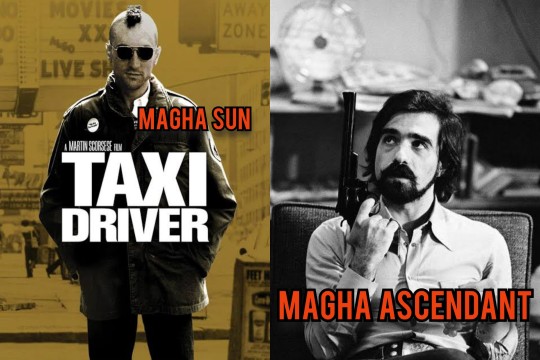
The character also suffers from a possible case of untreated mental illness, and insomnia -- and this seems to be a theme with all Ketu nakshatras in general.
Another film where the main character suffers from extreme insomnia is "The Machinist", starring Ashwini Moon Christian Bale whose character's insomnia and untreated mental illness literally contribute to his isolation and alienation.
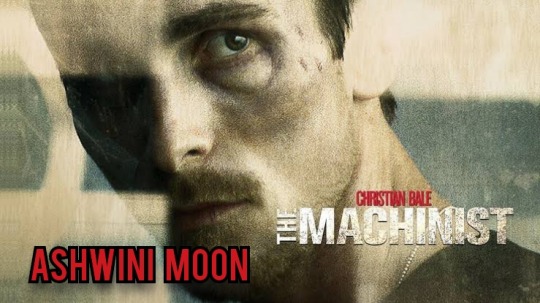
will be coming back to this film in my part 2 post
And the film "Fight Club", in which Magha Sun Edward Norton plays an insomniac character who has dissociative identity disorder. And his split personality is interestingly played by Mula Sun Brad Pitt.
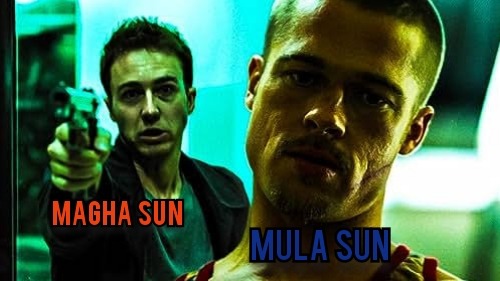
Then we have the film "Insomnia", directed by Ketu in Magha Christopher Nolan, starring Ashwini Sun Al Pacino who plays an insomniac detective who faces some mental challenges.
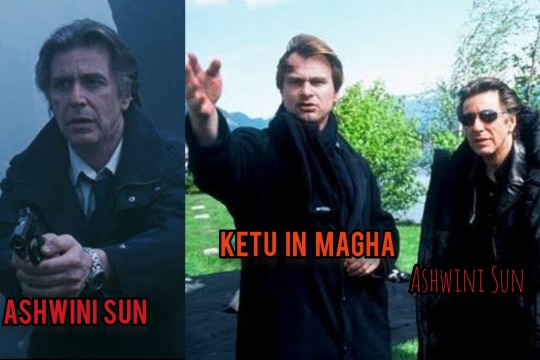
There is a spiritual belief about insomnia, which suggests that there may be a disturbance in one's spirit; unresolved issues that have been long suppressed can be linked to an imbalance of energy within the body. This causes restlessness and more mental problems. This could make sense as Ketu and the 12H deal with what is unconscious -- and how that tends to be our deep, rooted traumas and the way in which they affect us & those around us. And not just traumas, could just be repression of one's own internal suffering from either loneliness or external pressures. We see this with Patrick Bateman, whose only outlet is literal murder, or Tyler Durden's 'revolutionary' fight club causing more destruction around him as planned. Both characters violently act out from these unaddressed decaying energies within themselves and from within society.
The series "Sharp Objects", directed by Magha Moon Jean-Marc Vallé, mostly deals with family traumas, but also shows how those traumas and unresolved energies literally cause death and chaos around them.
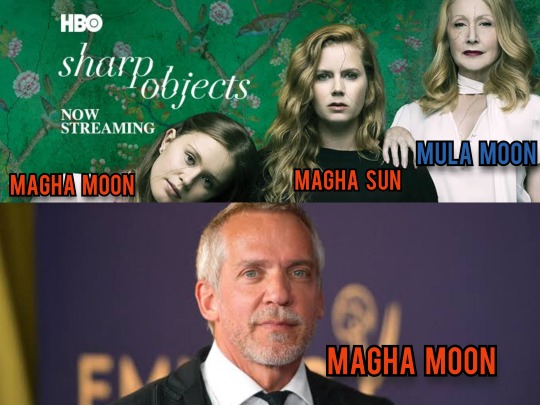
Camille Preaker, who is played by Magha Sun Amy Adams, is deeply traumatized and troubled. She has a history of self-harm and has many scars on her body; her self-destructive behaviour is a coping mechanism for what happened when she was young (sexual violence by a group of boys and witnessing the slow, painful and preventative death of her sister). Then we have her younger half-sister Amma, played by Magha Moon Eliza Scanlen, who has a hidden dark side that has been shaped by the family's troubled history and generational trauma. By the end of the series, we find out that Amma is the killer of the violent murders that have shocked the townspeople of Wind Gap. It is Amma who is responsible for all of the gruesome deaths of the girls whose teeth were removed. As Camille's coping mechanism is cutting herself as self-punishment for all the guilt she harbours from the death of her sister, Amma literally commits homicidal acts. All of this connecting to just how messed up, and complex, their trauma and the community they grew up in is. And then we have their mother, played by Mula Moon Patricia Clarkson, who has Munchausen syndrome and is responsible for the death of her oldest daughter. Camille was a witness to her sister's suffering and death, and she sees her mother as a monster and now her little sister is an extension of her. This series is such a good example of how our own personal unchecked traumas affect others, especially those who aren't involved. And how much destruction can be caused, as we see with Amma killing other girls as an 'outlet'. This is why I now realize how wrong I was about Ketu, as Ketu is not necessarily about isolating from society. Regarding society, Ketu will be the complex yet intricate unaddressed/rotting energies within society, and it always relates back to individuals' personal generational traumas. It makes sense that Magha relates to ancestry roots and origins of oneself, even the origins of one's trauma.
Now onto the film "Nocturnal Animals", which is directed by Magha Sun Tom Ford, stars Magha Sun Amy Adams and Mula Sun Jake Gyllenhaal.

Amy Adams plays Susan who is a successful art gallery owner. She receives a manuscript for a novel called Nocturnal Animals sent to her by her ex-husband Edward who's played by Jake Gyllenhaal. The book is extremely violent & tragic; but it actually turns out to be a symbolic reflection of their relationship and marriage. Bringing in the Ketu themes of unresolved trauma and getting to the roots of it (Mula theme). This book serves to make Susan confront how much of her actions fucked him up. The movie focuses on the confronting of one's past, telling of how trauma will still continue to shape the lives of those involved. And the movie shows that even Susan still has unresolved issues just by her repulsed reactions to extreme parts of the novel.
The movies "Split" and "Glass", stars two Ashwini Suns, Anya Taylor Joy and James McAvoy. McAvoy's character, Kevin, has dissociative personality disorder and these different personalities exist to keep him safe. His trauma is so extreme and deeply painful that it manifested into the creation of The Beast, the most dangerous and superhuman personality. Three kidnapped girls are prey to The Beast as they end up being devoured by it but there is only one doesn't fall victim to him -- and that's Anya Taylor Joy's character Casey.
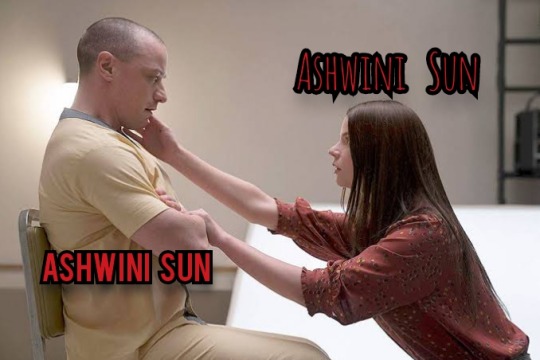
The reason why she doesn't fall victim is because she, too, has suffered extreme trauma and her resilience through it is what creates an immediate connection with Kevin. It is when The Beast sees her scars that he calls her pure, implying that those who have been damaged are the ones who are truly evolved.
(YouTube clip by me - 🎧)
youtube
Also, "Split" is another example of how deeply repressed energies and traumas of one can ruin everything around them and victimize those close to the Ketuvians (usually uninvolved people's lives being violently taken; "Split", "Sharp Objects", "American Psycho", "Falling Down" etc.).
Ashwini Moon Zendaya in the series "Euphoria" plays a character, Rue, who has been through a significant amount of trauma, including the passing of her father. She uses self-destructive ways to cope with her deep emotional pain and grief, very similarly to Magha Sun Amy Adams's character in "Sharp Objects". Rue uses drugs to numb herself from her harsh realities. There is a moment in the series in which she has a chaotic meltdown.
(YouTube clip by me - 🎧)
youtube
Something I now understand with Ashwini is how explosive, volatile and scary its ungrounded energy can be -- exactly why I'd commonly associate it with hysterical meltdowns which can lead to accidental or unplanned homicidal acts or other forms of harm/self-harm. This scene of Rue is vaguely taking me back to Ashwini Moon Christian Bale's spiraling and meltdowns in "American Psycho".
(YouTube clip by me - 🎧)
youtube
Ketu, especially with Magha, seems to cause erratic behaviours when its natives aren't purified of their long-accumulated baggage in their unconsciousness -- exactly why the 8H is also ruled by Ketu as Scorpio shares this particular theme. As long as there is deep disturbance and imbalance in the body, there is no rest for the soul -- even for future incarnations to come.
But now, I want to touch on the senseless harshness of Ketu. Remember, this energy embodies the eternal sucking void. Mula nakshatra relates to the center of the cosmic void and goes straight into the roots of it. Ashwini has already risen from it, while Mula is centering itself back into it. Mula is where we seek an awakening to the truth of what is behind reality. What is on the other side of the cosmic void? Truth is searched in Mula, but it seems that it is Ashwini that understands that chaos is the absolute truth of reality. There is no meaning to anything, which sounds nihilistic, but it is what makes life beautiful.
In the film "The Pianist", written & directed by Magha Sun Roman Polanski, starring Ashwini Sun Adrien Brody, starts out quite warm with a well-put together family and a handsome talented Ashwini man who dreams of being a pianist. But things take a drastic turn. We see a once bright-eyed boy turn into the shell of the person he once was after going through such harrowing events, and things just keep getting tragically worse and worse until there is not even a sliver of hope anymore. The majority of the film is literally just despair, senseless cruelty, and the protagonist's soul slowly becoming annihilated.
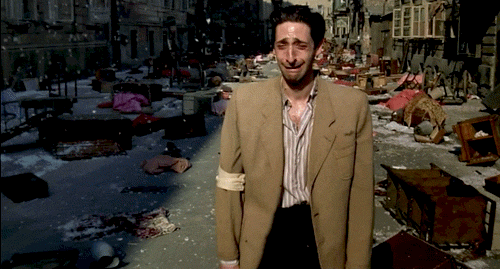
I've never watched a film more Ketuvian than this; surrounded by genocide, death and being completely isolated while being eaten by one's own lonely misery.
One moment you think one character is going to make it out alive somehow because they have the conviction and drive to survive, but the film immediately takes that idea away as they helplessly die. You think the protagonist is going to see some light, and the film even makes you slightly comfortable in some moments given the harsh realities, but you witness just how everything remains tragic. There are no answers to any prayers, as suffering is just ongoing. This tonality creates another layer of feeling trapped, and you watch as the character just lets life do whatever it wants to him as he is trapped in a world where he is helpless anyway. With Ketu, you realize that there was never any security or answers to this senseless chaos in this world to begin with.
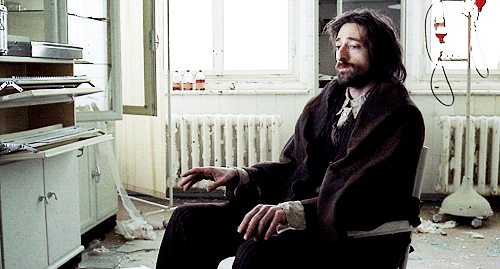
But his survival at the end makes you question why he even went through all of that. There was no lesson to be taken from such a tragic, horrifying experience. Why did his other friends and family die but not him? In the end, he became a successful pianist as he dreamt of from the beginning. He was exceptionally talented from the start; these events took everything away from him except his passion for the piano. What he went through was senseless, as Ketu has no prime motivation. Saturn will push you through the worst so that you can reach a level where you can now attain all of your reaped rewards, Ketu doesn't care for what you get in the end -- that's Rahu's objective, as Rahu deals with ego; Ketu deals with the evolution of one's soul and that usually involves its annihilation.
The kdrama "Save Me", stars three Ketu natives; Magha Moon Seo Yea-ji, Mula Moon Woo Do-hwan and Mula Sun Ok Taec-yeon. It follows Seo Yeah-ji's character, Sang-mi, and her family after moving into a new town. They become influenced and entangled by a religious cult. Sang-mi becomes aware of just how oppressive and dangerous the cult is when she & her family literally lose all control to them. Sang-mi's attempts to escape become futile, as she remains trapped under the oppressive abuse of the cult, turning her more into a shell of the person she once was.
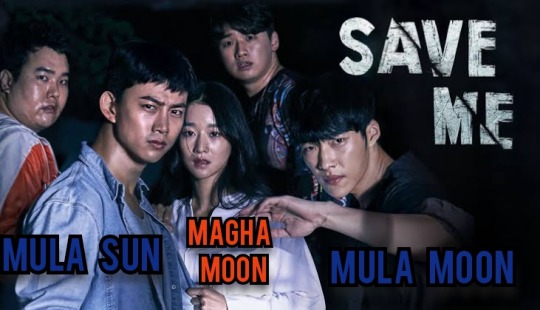
(The Mula male characters are the ones who find out about the Magha girl's whereabouts, and they plan to save her and her family from the clutches of the cult.)
She witnesses extremely harrowing events, and the drama makes you feel the sense of hopelessness that she's feeling -- trapped and completely helpless no matter how much she tries to save herself and family. There is a similar sense of hopelessness and lose of one's own identity found in "The Pianist", but in this drama it's more about extreme involuntary isolation from society (which I will be expanding on in part 2 of this exploration).
The film "Society of the Snow" is literally directed by Ashwini Moon J.A. Bayona, based on real life events. There's a documentary based on these events as well, "Stranded: I've Come From A Plane That Crashed On The Mountains", directed by Magha Moon Gonzalo Arijon.
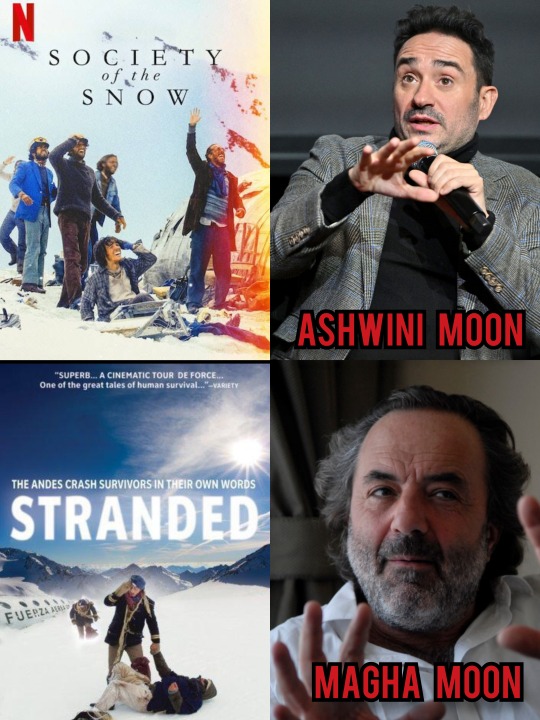
Now, in the "Society of the Snow", there is a tone of hopelessness set in the film because of the gruesome reality that these characters (based on real life people) experience. And never in their lifetime did they think that everything was going to change so drastically from just living the average life of normal teenage boys. These characters, who were in a rugby team, get on a plane that would soon crash onto glacier surrounded by endless cold harsh mountains -- with just a piece of the wrecked plane remaining in which they take shelter in. The protagonists are surrounded by the dead bodies of friends who did not survive the crash, and now they must spend the first night in harsh coldness while many are severely injured. They couldn't even sleep, the first night being spent with many of them crying and wailing out loud, nearly freezing to death. One day after, a rescue helicopter searches for them, and they all scream out for help. But the helicopter misses them as they're barely noticeable under all the glacier that surrounds them. This is when the sense of hopelessness and despair kicks in and intensifies as the story progresses. Now that chances of being rescued have completely fallen to zero, they realize that they can't ignore their growing hunger anymore. They all have no choice but to eat the flesh of the dead bodies after running out of chocolates. We see how these decisions mentally challenge some of the characters. It is truly tragic as they were stranded, isolated from the world and completely in despair in every waking day, for a span of 72 days.
After being rescued, we see just how malnourished they were from the looks of their bodies. They come back home bone-skinny and weak. And the monologue in the ending scene tells us how the survivors wondered; "Why didn't we all get to come back [home]?" "What is the meaning of it all?" These are the questions asked when we observe these raw Ketu events.
Ashwini Moon J.A. Bayona also made the film "The Impossible", which is about survival and resilience -- based on real life events. Much like "Society of the Snow", it also has a sense of complete despair and there is an involuntary separation of a family (which reminds me of "The Pianist" in which Ashwini Sun Adrien Brody's character is also separated from his family in the story).
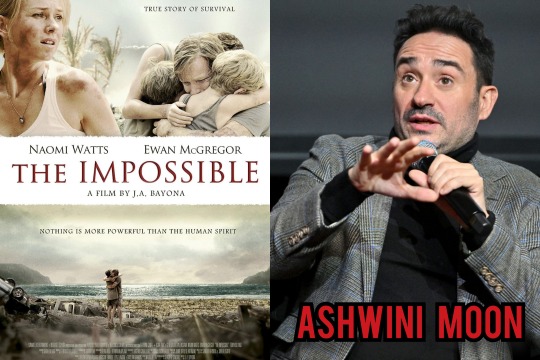
"Nothing is more powerful than the human spirit" it writes on the poster.
"Nowhere", is directed by Ashwini Moon Albert Pintó, a survival thriller about a pregnant woman who finds herself isolated from society as she's drifting in the sea trapped inside a container. Because of her newborn baby, she is forced to survive and protect her child even when there is no hope. The reason why she's even in the container is because she was fleeing a society of a dystopian future in which women & children are caged and murdered (Ketu's oppressive forces and her attempt to run away from them leads her to total isolation which is another manifestation of Ketu).
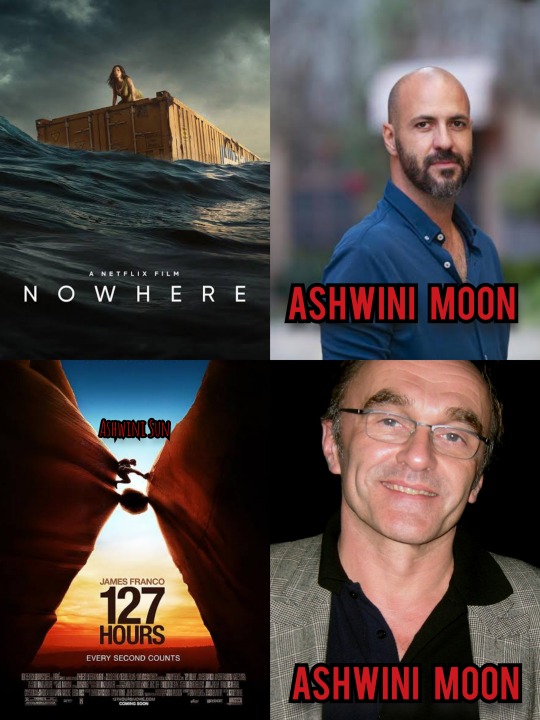
And we also have the film "127 Hours", directed by Ashwini Moon Danny Boyle, starring Ashwini Sun James Franco who plays Aron Ralston whose right arm becomes trapped against the canyon wall when he was on a solo canyoneering trip. When he is unable to release himself, we realize the severity of his situation. He is completely isolated and alone. His own supplies running out and he's losing his mind. The struggle for survival and one's own helplessness is a theme of Ashwini nakshatra as this eventually drives one into taking extreme measures for freedom -- as the audience sees him resorting to cutting his own arm off.
These themes seem to speak of the power and resilience of the human spirit, as emphasized in "The Impossible" and "Society of the Snow". Our ability to survive even just our own personal traumas must be a testament to our spirit being an extension of the Higher Power which is behind the happenings of all of these senseless yet significant experiences and events we go through.
It is in Ashwini that one's experience through harsh forces contributes to the spirit's evolution after total annihilation, which leads us on the path towards moksha. This is particularly why I state that Ashwini must be the last nakshatra, in my opinion of course.
Ketu is very pure by nature, and it wants to destroy impurities. The repression of one's accumulated dirt can manifest in destructive tendencies, this being a misdirected flow of Ketu energies wanting to express the very raw forces we're wired to run away from. By facing one's true inner self and embracing your entirety is how you embrace Ketu in general. But one must go deep and inward. All three Ketu nakshatras deal with getting to the roots for this reason.
Ashwini is ruled by the Ashwini Kumaras, gods of medicine and healing. Also known as divine physicians. In order to heal, one must get to the root of all disturbances in order to create the perfect medicine to heal. As Ashwini is ruled by the 1H, this does involve getting into the roots of oneself for self-liberation. Magha, on the other hand, is about tracing your own existence back to the consciousness of others -- usually family members and ancestors. Magha relates to generational trauma and shining light on that in order to be freer. Mula is symbolized by the roots of a tree, and 'mula' translates to 'roots'. It signifies ancestry roots as well, but mostly the truth. Mula is where disillusionment takes place as one gets directly into the roots of everything; going right into the galactic center -- which can also signify going right into the roots of our demons and letting all of that rotting energy burn from your body. And after this purification process, one's consciousness raises by default.
Ashwini has strong, undeveloped energies which can be tamed and grounded to be properly channeled -- in order for this to be achieved, one must let go of poisonous impurities so that they're no longer controlled/possessed by unseen forces. It is in Ashwini that we expand on the interconnection of the collective consciousness being tight, as this was secretly discovered in Uttara Bhadrapada and remembered in Revati. Ashwini nakshatra is extremely sensitive to outward energies, as are the rest of the Ketu nakshatras. Every individual's consciousness is affecting the whole world somehow. This being a Ketu theme in general describes the whole energetic field of the world and how we each play a part in it and affect each other's lives. As all Ketu nakshatras deal with getting into the roots of things, we must get dirty by digging into our own roots which are connected to the reasons for our layers of repressed emotions such as rage, numbness, resentment, hatred and grief which are commonly harboured in Ketu natives. These unconscious emotions, which form our Shadow Self, contribute to how we interact with the world and other people -- and there's always that capacity to harm or further traumatize others because of our own unchecked, hidden troubles. Mula also perfectly shows how all of the complex, interconnected traumas of everyone else are intertwining and creating more chaos and confusion in society; and the disillusionment to how the oppressive systems of society are just breeding more of these pains & troubles -- which in turn, in Ketu fashion, demonstrates just how trapped everyone is.
Continued in Part 2 of this exploration
#ashwini#aries#magha#leo#mula#sagitarrius#1st house#5th house#9th house#vedic astrology#astro observations#astrology#sidereal astrology#nakshatra series#vedic observations#sidereal observations#Youtube
270 notes
·
View notes
Text
Look what Google just recommended to me!!!!
I already own (and love) Shabbat and Portico.
But I am OBSESSED with the rest and must acquire them immediately.
Top of my list is Love Japan because LOOK AT THIS BEAUITFUL BOWL OF MATZO BALL RAMEN!!!!!

We hear a lot about Jewish people in Europe and MENA, but we do not hear a lot about Jewish culture as it blends with East Asian cultures, and that’s a shame. Not just because it erases the centuries of Jewish populations there, but also because there are plenty of people of mixed decent. People who may not have come directly from Jewish communities in East Asia, but people who have a Japanese Father and a Jewish Mother, for example. Or people in intercultural marriages. These are all real and valuable members of the Jewish community, and we should be celebrating them more. This cookbook focuses on Jewish Japanese American cuisine and I am delighted to learn more as soon as possible. The people who wrote this book run the restaurant Shalom Japan, which is the most adorable name I’ve ever heard. Everything about this book excites and delights me.
And of course, after that, I’m most interested in “Kugels and Collards” (as if you had any doubts about that after the #kugel discourse, if you were following me then).

This is actually written in conjunction with an organization of the same name devoted to preserving the food and culture of Jews in South Carolina!
I’m especially excited to read this one, because I have recently acquired the book Kosher Soul by the fantastic, inimitable Michael J. Twitty, which famously explores faith and food in African American Jewish culture. I’m excited to see how Jewish soul food and traditions in South Carolina specifically compare and contrast with Twitty’s writings.
I’m also excited for all the other books on this list!
A while ago, someone inboxed me privately to ask what I recommended for people to read in order to learn more about Jewish culture. I wrote out a long list of historical resources attempting to cover all the intricate details and historic pressure points that molded Jewish culture into what it is today. After a while I wrote back a second message that was much shorter. I said:
Actually, no. Scratch everything I just said. Read that other stuff if you want to know Jewish history.
But if you want to know Jewish culture? Cookbooks.
Read every Jewish cookbook you can find.
Even if you don’t cook, Jewish cookbooks contain our culture in a tangible form. They often explain not only the physical processes by which we make our meals, but also the culture and conditions that give rise to them. The food is often linked to specific times and places and events in diaspora. Or they explain the biblical root or the meaning behind the holidays associated with a given food.
I cannot speak for all Jews. No one can. But in my personal observation and experience—outside of actual religious tradition—food has often been the primary means of passing Jewish culture and history from generation to generation.
It is a way to commune with our ancestors. I made a recipe for chicken soup or stuffed cabbage and I know that my great grandmother and her own mother in their little Hungarian shtetl. I’ll never know the relatives of theirs who died in the Holocaust and I’ll never meet the cousins I should have had if they were allowed to live. But I can make the same food and know that their mother also made it for them. I have dishes I make that connect me to my lost ancestors in France and Mongolia and Russia and Latvia and Lithuania and, yes, Israel—where my relatives have lived continuously since the Roman occupation even after the expulsions. (They were Levites and Cohens and caretakers of synagogues and tradition and we have a pretty detailed family tree of their presence going back quite a long time. No idea how they managed to stay/hide for so long. That info is lost to history.)
I think there’s a strong tendency—aided by modern recipe bloggers—to view anything besides the actual recipe and procedures as fluff. There is an urge for many people to press “jump to recipe” and just start cooking. And I get that. We are all busy and when we want to make dinner we just want to make dinner.
But if your goal isn’t just to make dinner. If your goal is to actually develop an understanding of and empathy for Jewish people and our culture, then that’s my advice:
Read cookbooks.
#Judaism son#Jewish culture#Jewish cuisine#culinary tradition#culinary history#foodways#cultural preservation#tangible culture#jumblr#Judaism#food#cuisine#kugel discourse#Jewish joy#jewish positivity#Jews around the world#East Asian Jews
146 notes
·
View notes
Text
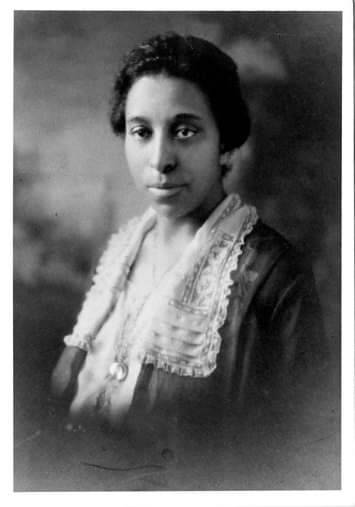
Lucy Diggs Slowe (July 4, 1885 – October 21, 1937) was an American educator and athlete, and the first Black woman to serve as Dean of Women at any American university. She was a founder of Alpha Kappa Alpha sorority, the first sorority founded by African-American women.
Slowe was a tennis champion, winning the national title of the American Tennis Association's first tournament in 1917, the first African-American woman to win a major sports title. In 1922, Slowe was appointed the first Dean of Women at Howard University. She continued in that role for 15 years until her death. In addition, Slowe created and led two professional associations to support college administrators.
Lucy Diggs Slowe was born in Berryville, Virginia to Henry Slowe and Fannie Potter Slowe. While various sources put her birth year as 1885,[3][4] others have said 1883. She was one of seven children. Her father's occupation has been reported as a hotel operator, restaurant proprietor and farmer. He died before Lucy turned one and her mother died shortly after. Following her mother's death, Lucy and her sister Charlotte were raised by her aunt Martha Price in Lexington, Virginia. At thirteen, Lucy and her family moved to Baltimore, Maryland, where she attended the Baltimore Colored High and Training School. She graduated second in her class in 1904, receiving one of the two-sponsored scholarships to Howard from the Baltimore City School Board.
Slowe was the first person from her school to attend Howard University, the top historically black college in the nation, at a time when only 1/3 of 1% of African Americans and 5% of whites of eligible age attended any college.
After graduation in 1908, Slowe returned to Baltimore to teach English in high school. During the summers, she started studying at Columbia University in New York, where she earned her Masters of Arts degree in 1915.
#black tumblr#black history#black literature#black excellence#black community#civil rights#black history is american history#black girl magic
96 notes
·
View notes
Photo






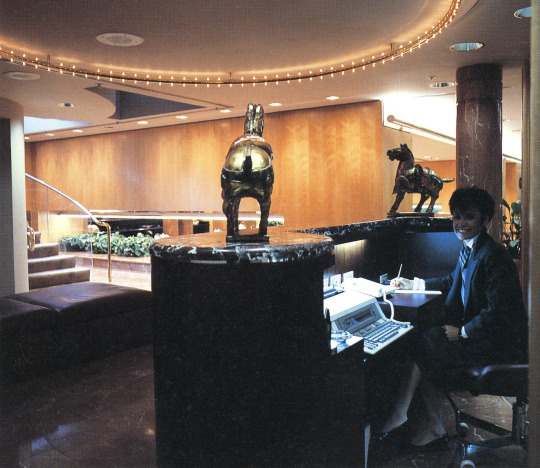

The Portman Hotel - San Francisco, CA (1987)
Designed by John C. Portman & Associates
Scanned from the book, ‘American Hotels and Their Restaurants’ by Gen Takeshi Saito (1988)
490 notes
·
View notes
Note
If gazebo deaths are so widespread, why does anyone ever perform at one? Are they forced? Does the siren song of the gazebo lure them closer until standing under it's awning seems like a good idea? Do they simply not know of the danger, the whole gazebo-eating-peoole thing only known to a few select people? Many questions
I mean.......how do you know that the elevator you step onto won't plummet to earth? How do you know that the salad you order at a restaurant won't give you salmonella? That your car's brakes will go on working, even when you're about to crash into the highway's concrete divider?
How do you know that any part of the world you move through won't kill you?
And then, more troubling---if the people who are tasked with reviewing elevator safety, food safety, car safety, chose to occasionally (occasionally! not all the time, of course not, they're reasonable) look the other way, and let someone hurtle towards their doom....would it be so bad? With that one terrible sacrifice, the inspector ensures that the elevator never breaks, the salad is never rotted, the car will work every. single. time. Or at least, every other time but the first.
This becomes even less clear-cut when the elevator has preferences, when the salad revolts against being eaten with a fork, when the car contents itself with gas every day except the one where it wants blood. Gallons of it.
It's an important precept to remember, in the keeper community. Not every offering laid across a gazebo's wooden planks or iron latticework is accepted. Sometimes, a jazz quartet performs---and despite the keeper waiting with baited breath for the moment of reckoning, the quartet ends their set, packs up their instruments, and leaves. Sometimes, the keeper will find small animals strewn around instead, hallmarks of a gazebo perfectly uninterested in its human audience. (It's uncommon, certainly, but see Leeman et al. 2018 for a longitudinal study on USian gazebo feeding habits.) Not every gazebo wants to swallow a dance troupe whole; some of them prefer stalking prey like loiterers and the homeless, while others will opt for a marching band over a Shakespeare in the Park, for reasons unknown.
Per American Association of Canopy Keepers guidance, unaware victims seem to satiate gazebos for an average period of 2.4 years, compared with knowing victims' 1.87 years; therefore, best practices recommend ignorance. Fortunately for them, at the end of the day, "will this kill me?" is a numbers game, and to borrow a phrase---
Boy, are we bad at math.
#this is very very satisfying.#''what if you could shove all of your feelings about capitalism and families and public programming into one shape?''#this is that. anyway we're going to call it#dark pavillionism#because it's fun and I need something to tag all this nonsense with
72 notes
·
View notes
Text
Salvation
Series Masterlist
Kind of a sequel to Say No to Me, but can be read as a standalone fic
Fandom: Narcos
Pairing: Javier Peña x Reader
Rating: 18+ (warnings: mild choking, name calling, Papi kink, Mami kink, handcuffs, crying, spanking, fingering, mild cuckolding kink. Justification of violence and American imperialism?? Idek you guys)
Word count: 5.8k words
Summary: Shaken to his core by witnessing Colonel Carillo shoot a kid, Javier comes home guilty and questioning the role he plays in the war against drugs.
A/N: Say No to Me did soooo well, so I wrote a little more about about Javi and his wife. Hope people like this too 🥺🥺🥺. Warning: The characters’ views on violence and geopolitics are not my own.

“I don’t see the difference.”
“What do you mean you don’t see the difference? Those assholes poison this country, poison the US. We’re trying to stop them.”
It was their first argument. Leave it to him to bring work home and argue about it with the pretty professor he’d been dating. His job was always a point of contention for them. She didn’t care that he flaked out on dates, forgot to turn up for dinner with friends and slinked into bed late at night with no explanation as to where he’d been. No. What she worried about was the fact that he was a man with a gun.
The first time he met her outside the restaurant the both of them frequented, he was on a raid where her friend happened to live. He’d opened a door, gun in hand, just like he opened many other doors in Columbia in his quest for men associated with the Medellin cartel. He’d surveyed the rest of the place like he always did. Behind the woman was her. The beautiful woman he’d been buying buñuelos for at the restaurant like he’d buy a drink for a woman at a bar. The woman who’d smiled at him in a silent thanks each time the waitress brought her the buñuelos he ordered for her. The one who reciprocated by sending him coffee.
She never saw him the same again. She stopped meeting his eyes when before, she’d always looked around for him shyly. She stopped eating at the restaurant, opting instead for takeaways he found her eating in her car. He’d confronted her, sweet-talked her and gotten her to take his buñuelos again. Talked her into having coffee with him every morning and took her back to his place to fuck.
They always wondered out loud to each other what life would be like had he not done that.
“I wouldn’t be picking up dirty socks from all over the apartment.”
“And I wouldn’t find hair clogging the drain. But I would also be perpetually single.”
“And that’s a good thing or a bad thing?”
“Bad thing. No wife to come home to. No one to wake me up with a warm wet mouth around my cock.”
“Jodón!”
“Te amo, Cariño. Eres mi corazón, mi conciencia.”
If he weren’t a married man, he would have driven to the brothel he used to frequent before he decided he would go on a date with her. He’d take the first willing woman he saw and fuck his pain, his frustrations, his failures into her. She’d be nothing but a warm wet thing in which to bury everything for a bit of cash.
Doing that with his wife didn’t take away the pain or the frustration. It produced guilt. Finding hand-shaped bruises and bite marks on her body made her hide her face in his chest to keep her sweet shy smile away from him. But it just made him feel undeserving of her, like he was tainting the one truly good thing in his life with his violence and brutality.
Her black and white perspective on his job changed eventually. Marriage wouldn’t have been possible without it. For the first time, he felt a pang of guilt for deceiving her into marrying him. When it was just coffee and sex, she insisted that he keep his gun and badge away from her sight. They scared her. He felt offended that she wouldn’t accept him whole.
Eventually he stopped hiding work from her. She grew comfortable with his gun on their bedside table along with her pretty night lamp, books, personal diary, jewelry, and framed picture of their wedding at the embassy. She no longer flinched when she wrapped her loving arms around him and found his gun tucked in the back of his jeans.
He changed her, turned her into someone who could casually listen to him vent about the day to day violences of his job. Turned her into a woman who shared a bed with the kind of man who stood by as his colleague put a gun to a kid’s head and pulled the trigger. He wanted to drive off to the closest bar and drink himself to death, but as though on autopilot, he’d already driven himself home. He parked the jeep in the garage, leaned back in his seat and closed his eyes.
What should he have done to stop Carillo? Could he have stopped him at all? It wasn’t as though he knew what the man would do… Or maybe he did. He couldn’t plead innocence over Carillo’s actions when he was the one celebrating his return, knowing fully about his cruel tactics. He sensed something was off when Carillo made those kids kneel on the ground, hands on their heads. Some of them still had baby fat in their cheeks. The Colonel knew what he was going to do. It was why he left Steve behind.
Steve was given immunity from these cruelties. While he’d been a bachelor when he first met Carillo, Steve was always the family man with a pretty wife to go home to. And now a baby. Now, he was also a family man with someone awaiting his return. Did Carillo not know that? Did he not see the glimmering gold band around his finger? Or did Carillo see something in him that indicated he was prepared to witness such horror? Something that said he lacked a heart unlike Steve. How did Carillo manage to go home to his wife and kids? How did he hold them in his bloodied hands?
“Javi?”
She’d opened the jeep door and he hadn’t heard a thing. He was truly out of it.
He whispered her name as she cupped his cheek, taking all the comforts that her touch afforded. He closed his eyes and swallowed as the guilt set in. The kid’s parents would need comfort tonight, not him. He didn’t deserve this. He should pry her hand off of him, reject her gentle touch. Stop her from tainting herself further.
She leaned close to him and he hummed gratefully for the proximity that allowed him to breathe in the fresh scent of her citrusy soap and her coconut shampoo.
He said her name again, like a prayer, like she was his god and he, a devotee who sought her for salvation. “It’s going to be okay, mi amor. Whatever it is…It’s going to be okay.”
“I need you,” he said as he nuzzled into her neck.
“You have me, Javi. I’m right here, whatever you need. Okay?” She swept her fingers through his hair and massaged his scalp, already taking care of him.
He hopped out of the car with a renewed energy now that he had her permission. “Need you right here, baby,” he muttered hurriedly and curled an arm around her waist, picking her up and placing her on the hood of the jeep. He tugged at the satin tie holding the robe together, untying it to reveal her in her purest form. No underclothes, no jewelry except her rings, just her. He palmed her shoulders and pushed the garment off of her, holding himself back from ripping it off when she took a few seconds too long to free her arms from the sleeves.
He spread her legs apart, mumbling, “Need to see you, querida. Need to see your pretty pussy.”
He placed a hand on her belly and pushed, forcing her to lie back down on the hood. It had to be uncomfortable, but he couldn’t think beyond getting his dick wet. She said whatever he needed, so he was going to take whatever he needed. He was going to take everything he could out of her, leave her spent and unable to offer him anything more.
He pushed her legs wider, spreading her out obscenely for his eyes. Her body held marks of their passion. Her knees were bruised from kneeling at his feet and bringing him pleasure with her lips. Bruises of various colors were scattered all over her, tainting the pure smooth skin she brought into their relationship.
She left her marks too. If he looked in the mirror, he would see the crescent shaped scars she’d left behind, some still healing from spilling blood for her. He would find that her name was etched on every scratch and bite she left behind, claiming him as hers and contrasting between the scars he did not ask for, scars he earned chasing sicarios on rooftops.
Javier was marked by all the successes and failures of this perpetual chase of the bad guy. He’d tripped, fallen, jumped from balconies, been shoved into walls, pistol whipped and grazed by bullets.
She’d asked him for one thing only when he was on one knee in front of her— Give me all of you, Javi. So he did. He came home every evening, touched her with hands covered in the blood of the innocent collateral damage in this war.
He bent over her and pressed his chapped lips on her plush ones as his hand found her breasts. She tasted sweet as she always did. There was something beyond the sweet treats she was so fond of. It was just her, just the sweetness of her heart and the kindness of the words uttered by those lips. Once upon a time, she did not like his taste. Their first kiss had her pull away, face scrunched and the lips that’d rejected him complaining about the taste of cigarettes. He used to keep a pack of gum on him at all times- in his pocket, in the glove compartment, on his bedside table, in the living room just to rid himself of the vile taste of his terrible days so he could drink her sweet moans from her lips.
She no longer complained. She’d gotten used to it, had grown to like it even. They didn’t want to waste time washing away the day’s traces before getting lost in each other. They took each other as they were, accepted the ugly and the gruesome, the sweat and the weariness, the mistakes and the guilt.
He released her from the kiss and nudged her chin up by his nose. She whimpered quietly and returned her hand to his shoulders to push his leather jacket off. He helped her out, shrugging the garment off and letting her hands run over his chest with only the thin gray shirt separating them. He nibbled on her chin, reining himself back so as to not bite too hard. She had to be a few orgasms in to enjoy such roughness. He fondled a breast in his hand, pinching his index and middle fingers together to tug at her nipple.
The vibrations of her moan as he kissed down her throat went straight down to his cock. He marked her all the way in his journey from her neck to her cunt. Kiss, bite, suck, nip. Kiss, bite, suck, nip. Kiss, bite, bite, bite—
Mine, mine, mine.
Fingers found her cunt faster than his lips that were busy marking her as his. He rubbed her with his tainted hand and she raised herself off the hood of his jeep to meet his hand. He pushed her back down and placed a firm hand on her belly, pressing down to send a message.
Stay down. Obey.
She stayed put, taking only what he gave. Slick coated the tip of his finger as he pushed between her pussy lips. “Were you touching yourself before I came home, querida?”
“Yeah,” she managed to voice.
“Couldn’t wait for me?” He asked as he pushed a finger in, roughly and with no mercy. She gasped silently as she squirmed on the metal surface.
“Sorry,” she whined as he found the spot inside her that drove her wild, one that her dainty fingers couldn’t reach. “Papi, ‘m sorr—” she shrieked as he pinched her clit.
“What did I tell you about touching what’s mine?” He asked, getting irrationally angry about her pleasuring herself. Useless. Useless on the job, useless at home. An absent and neglectful husband whose wife had to resort to touching herself.
“That everything that’s yours is mine too.” He could hear the smile in her voice as she recalled the sweet beginnings of their marriage even when spread out in the most vulgar way for him.
“Everything. Except this,” he said, palming her cunt. “Let me just have this. All for myself.”
“So you’ll be a good boy and share everything else? Lend my ass to some other guy, it’ll be f—” she gasped mid-sentence as he grabbed her throat and pulled her up to meet him face-to-face.
“You letting other guys in when I’m not looking, baby?” He asked, applying the slightest pressure around her neck. He knew she would do nothing of that sort. He wouldn’t either. For all his faults as a husband, he was loyal. But they liked pretending sometimes. It played into his insecurities a little, into his fears of being so inadequate for her that she had to look elsewhere. It wasn’t a fear for him sexually. Yet. But it angered him when she asked a colleague to do so much as put up a shelf in their living room. That was his job as her husband.
“Hmm, sorry Papi… He was right there and I really missed you,” she played along as she thumbed his lips.
“Told you you were all mine, baby…” he said, pinching her clit just hard enough to bring her the pain she craved from her. She jumped and wrapped her legs around him, the heels of her feet digging into his back.
“You just told me that just now! How was I supposed to know before this?”
“Put a ring on it, didn’t I?” He said before he took her left hand and thumbed her rings. “I put three on it, in fact. What else is a man supposed to do, hmm? Put a collar on you?”
Her breath hitched, letting him know that she very much liked the image he put in her head. He took it as his cue to continue, “Would you like that? Hmm? I’ll finally make you look like the bitch in heat that you are.” She tightened around his finger and dug her feet into his back harder as though she wanted to pull him closer.
“Hnnngg please!” She whined as she began fucking herself on his middle finger. He added his ring finger, making her fuck herself on the finger that showed the world who he belonged to. Showed the world that he belonged. Showed him he wasn’t a lone man, that there was someone home who gave a fuck. He pressed the pad of his thumb on her clit, circling it gently, barely touching as she used his fingers for his pleasure.
“Javiii!” She cried his name, her voice grabbing at his heart. He belonged. He unbuttoned his shirt and pulled her flush against his chest, needing to feel her skin against his.
“Yeah, baby. ‘M here, I’m yours,” he whispered into her neck and sucked on that spot that was bruised from all the times he’d wrapped his lips around it because he knew it made her melt in his arms.
She moaned his name over and over— Javi, Javi, Javiii— and he drank in all of it as he fucked her with his fingers. It grounded him, her moans. Told him she was real, this life they had was real and pushed away the horrors he’d participated in. He was just Javi, her husband Javi who just came home from work and made her scream his name. Not Agent Peña.
“Come for me, Cariño,” he encouraged when he felt her nearing her peak. He continued doing what he was doing, kept up the pace, kissed her neck and squeezed her tits, taking turns between each one when she finally collapsed in his arms, dropping her entire weight on him as she gasped for breaths.
“Want more,” she whined, her voice raspy from screaming his name. She palmed him through his jeans, making him hiss before she moved up to his belt buckle and tugged impatiently. “Want your cock, Papi.”
“Greedy little thing,” he scolded before kissing down her neck. “I just made you come, didn’t I? You’re still shaking but you already want more?”
“Pleeeeease!” She cried, pushing his shirt off his shoulders and letting her hands roam his chest. “I missed you.”
“Missed me? I fucked you silly in the morning before you went to work. Did you forget?”
“Missed you all day. I thought about it the whole time, thought about your cock.” She said, palming him through his jeans. He managed a smirk, trying his best to not let her know how much her touch affected him already.
“Thought you were more professional than that, bebita. Did you rub one out in the restroom thinking of me? Take a break from teaching to touch this wet little cunt for me, Mami?” He asked as he touched her gently, knowing she was still sensitive from how he played her with his fingers.
She shook her head and nuzzled into his neck, her bashful smile catching his attention before she could hide it away from him. “Can’t disappoint my darling wife, now can I?” He teased, quickly unbuckling his belt and undoing the button and zipper of his jeans to free himself. She reached behind him and squeezed his ass before she grabbed his gun and set it aside on the hood.
The cavalierness of her action struck him. The woman who was frightened by the mere sight of his gun was now handling it casually. If he had noticed it any other day, he would’ve been proud. But not anymore… He had changed from the ambitious fool he used to be in Laredo. And he had changed her.
“Hmm yeah, don’t want your wife letting other men in her ass,” she teased as her hands roved over his torso, the pointed tips of her nails making the hairs on his arm stand up. She reached his dick and wrapped her hand around it when he decided enough was enough. He slapped her hand away, pulled her off the hood and turned her around before pushing her back down face-first. It happened so quickly that she didn’t seem to realize what had happened.
Usually, he felt guilty only after taking his frustrations out on her. Now, he felt the guilt had already begun to surround him, thickening the air he breathed until he felt it was choking him.
“Stay right there,” he ordered, holding her down as he reached into his pocket for his handcuffs. He snapped the cold metal around her wrists and leaned over to whisper into her ear, “I’m gonna take you rough, cariño. Can you handle it?” When she nodded, he asked her again, “Will you let me fuck you hard? That’s okay tonight? I need to hear a yes. A clear yes.” The nodding wasn’t enough for him. He didn’t feel right in the head and he needed her to be clear.
“Yes, Javi,” she said, turning a little, her cheek pressed on the hood as she met his eyes. “I want it. I’ll tell you to stop if it gets too much.”
“Okay,” he breathed out as he pulled his leather belt off through the loops of his jeans. As the leather cracked in the air, he noticed her ass clench. He grabbed a handful of her behind and let go before swatting the flesh. Mesmerized by the jiggling of her behind, he let her find reprieve for a few second before he repeated the motion for the other cheek. He reduced the gaps between each slap to her ass, enjoying her screams and cries, unbothered about whether they were waking the entire damn neighborhood.
When he felt she was adequately prepared, he folded his belt in two, holding the metal buckle tight in his hand and wrapping the excess leather around his fist to make sure he didn’t accidentally hit her with it. They liked leaving marks on each other, but none that would be as painful and permanent as the damage metal would cause. He reached between her legs and found her pussy, wet from her cum, making her let out the soft sounds he would lock up in the depths of his mind to look back on whenever he missed her.
“Love the pretty sounds you make for me, bebita,” he praised, pleased with himself as he caught her dazed smile. As much as he liked seeing her in the throes of pleasure, he liked it more when he could bring out her sweet smiles. It made him proud, knowing he could do that to her.
“Think you forgot the belt, Papi…” she said softly, her tone contradicting the depraved thing she was requesting.
“So eager,” he mumbled, his words buried by her scream when his belt made contact with her ass. “Quiet, querida. You don’t want to wake our neighbors. Don’t want them to run over here to check on you now, do we? They might accuse me of being an abusive husband and I will be forced to explain that my little pain-slut of a wife begs for this shit.”
She trembled underneath him, holding her hand up to seek comfort. He took her hand glady, entwining their fingers and giving it a kiss before he dropped it back down. She huffed in disappointment, making him feel just a little guilty for taking her comfort away from her. Promising himself that he would give her all the love and affection she needed after this, he slipped his ring finger inside her. He was met with no resistance and he enjoyed how she took him in, enjoyed how she dripped down his finger and coated the gold band with her deliciousness.
“You would like that, won’t you? My little exhibitionist. I knew you were one when you made me finger you in my jeep before I could take you home for a proper fuck,” he reminded her of their first time together, delighted in himself as she tightened around him. He gave her a few quick pumps before withdrawing abruptly to make her taste himself on his fingers. He tightened his grip around the belt and landed another one, the black leather kissing her skin. His hand effectively muffled her scream, but she bit down on him hard, making him hiss.
He fucked her mouth like he fucked her pussy, aloowing himself to be satisfied with how her tongue swirled around his fingers. Forgetting himself, he pressed himself against her ass, grinding to relieve himself just a little. She pushed back at him and he took a step back, realizing what he’d done.
“Mierda!” He cursed. This was not the right time to rub the rough denim of his jeans on her sensitive behind.
“Lo siento, mi amor…” he apologised, bending down to kiss her temple. “Just… can’t wait to have you.”
“Just a— just few more, Javi baby…then— and you can have me,” she breathed out between pants.
“How many more? How many can you take?”
“Four. Each. No breaks, just go. Alternate it.”
“Sí, Mami,” he nodded, taking her command. He crumbled up the soft tie of her robe and pushed it into her mouth before he stood back and took quick aims, raining her with one hit after another.
Her cries and screams were muffled by the cloth he’d shoved in her mouth, but he was certain she would be heard if someone happened to walk by the garage door. While this was a safe neighborhood thanks to it being embassy staff quarters, late night screams were unfortunately not a rare thing for the city. At other times, it chilled him to the bone and made him want to send an armed bodyguard with his precious girl wherever she went. Now, he contented himself with the fact that nobody would come knocking to check on the poor screaming woman.
He pushed his jeans down to his knees and lined himself up with her tight, wet heat before forcing himself in.
“Feel. So. Fucking. Good.” He grunted, alternating each word with a thrust into her pussy. She gripped him so tight, so good, so fucking good.
“Dios mío, Mami. Tan perfecto,” he spewed praises, grabbing her hair with his fingers and giving her a painful tug to force her to show him one half of her face. She was utterly debauched, freshly washed hair all tangled up in his hand, eyes glazed over with everything he gave her, lips bruised and swollen and cheeks covered in her tears. He was sick in the head, he knew that and God, she knew that too. He was a sick fuck, making her cry for him, getting himself harder in her cunt as he watched her spill more tears from his thrusts.
“Lo siento,” he mumbled, still giving her what brought on the tears in the first place. He knew she wanted it, she’d told him so several times, reassured him as she cradled him in her loving arms. She understood him, sometimes more than he did. She knew the depths of his wretched would and found herself a place in it rather than running away screaming.
But that didn’t make him stop apologizing, “Lo siento, Lo siento, por favor… Mi amor, perdóname, por favor—” his words caught in his throat and he let out a sob around her name. He let his tears fall, bent over her and slipped an arm around her shaking body to pull her close to himself. He buried his cries into her neck as his thrusts slipped out of rhythm.
She spat out the cloth that he’d stuffed her mouth. “Javi? Are you okay, baby?”
He shook his head, unable to hide himself from her any longer. “No te merezco,” he whispered.
“Uncuff me. Wanna— need to touch you,” she begged. He snapped her cuffs open, having left it unlocked for her safety. Her hand was on her immediately, comforting him with her touch.
“Javi…I got you, honey. I got you,” she reassured him, taking his hand in hers and giving him a squeeze. He peeked out a little like a frightened yet curious child and caught the gleaming silvery metal of his pistol on the hood. It simply sat there, too close to his wife, not inspiring the fear it should in her. He’d ruined her so much that she could simply have it in her line of vision when she took him.
“Lo sien—”
“Javi, Javi, it’s okay. Everything’s okay, mi amor… It’s alright.”
“Dime que me quieres,” he begged. He needed to know, needed to hear that she still loved him even though he doubted she would if she knew Agent Peña as much as she knew her husband Javi.
“Te quiero, te amo, Javi. Mi amor, mi corazón, mi—” she whined as he unknowingly hit a spot. All these years knowing her and he somehow didn’t know that this did it for her. He repeated the motion, thrusting in the exact same angle with the same vigor that made her cry so sweetly.
The world turned hazy around him and for just that moment, he was just Javi, just her Javi. He belonged to her and the pleasures she brought him, belonged right in her sweet pussy that made his lips moan her name over and over and— He let out sounds he didn’t recognize to be from his throat as she gripped him like a vice and he struggled with the in and out motions, needing to just bury himself in her for eternity and never leave. As though she’d heard his plea, she granted him the high he’d come home craving, pushing him over the edge yet holding onto him, keeping him safe, keeping him hers.
He stayed put even after he’d spilled inside her, needing the closeness, needing to surround himself in all her goodness whether he deserved it or not.
“Javi…What happened, baby?” She asked, caressing his hand with a tenderness that warmed his heart. “What were you apologizing for? What happened?”
He removed himself from her and turned her around to face him. He kept his eyes on the ground as he retrieved the robe that had fallen to the floor. He draped the fabric around her and she stumbled as she took a step ahead. He pulled his jeans up and zipped up before he surveyed her form. She couldn’t walk without limping. Fuck! He was the piece of fucking shit.
He picked her up and she wrapped her arms around his neck. She kissed him on his chin and then on his cheek, keeping her eyes on his as he carried her through the corridors. It was thankfully too late for anyone to be wandering outside.
He laid her out on the couch when they got home, opting to sit on the floor at her feet rather than next to her. She let him place his head on her lap and even massaged his scalp with her caring hand. He shut his eyes and let himself get lost in the feeling, needing the comfort despite being undeserving.
“You were right,” he spoke quietly into the night.
“About what, mi amor?” Another time, he was sure she would have laughed and said she always was.
“When you said you didn’t see a difference. Our first fight. You said you didn’t see the difference between them and us. ‘S bad no matter who does it, the violence. Guns.”
“That was a long— why are we talking about this now? Is that what’s got you so worried? Javi, I didn’t know what I know now. It was a very…reductive way of thinking about it. I told you that much later.”
He felt he’d manipulated her somehow, put the perspective of the bright-eyed young Javier who’d come to Columbia to be ‘the good guy’ who put bad guys in jail and saved the world or whatever the fuck he thought he was going to do. He had done good, sure, but the bad… Oh god the bad.
“Carillo is back.”
“Yeah, you told me…”
“Whenever we go on a fucking operation, the guys we’re trying to nab are always a step ahead of us. Escobar’s got informants everywhere. Kids. Some the size of your nieces. Couple teenagers. Bad situation at home, either they don’t have a choice, or they don’t yet understand what the hell they’re doing… I thought we were just going to scare them. We rounded them up, Carillo was doing the talking. This kid got too mouthy, you know that kind of teenager with the ‘fuck the police’ attitude and enough blind courage fuelled by his newfound independence… It just felt off, baby. I should’ve done something, but— This is how it’s going to go from now on and everyone will turn a blind eye because we’re just that desperate.”
“Javi… Tell me what happened.”
“He shot him,” he managed to say. “Carillo shot the kid. To make a fucking point.”
Her hand stilled in his hair and her eyes widened. “I want to think there’s a difference, but it’s getting harder and harder everyday to see it. Escobar’s using these kids to save his own ass and we’re killing them to send him a fuckin’ message.”
“You didn’t pull the trigger.”
It was a statement, but he replied as though it was a question. “I didn’t pull the trigger.” He was a piece of shit, but he needed her to know that he hadn’t gotten that bad.
“You can’t carry others’ sins on your back, Javi.”
“I was there when—”
“So were the others. And Carillo pulled the trigger. You think he’s at home apologizing to his wife?”
Yeah but you didn’t marry Carillo.
He shook his head and she took his face in her hand, cradling his cheek like he was something precious. “You do what you can, Javi. Your hands are as clean as can be for a DEA Agent. You can’t bear other men’s sins. And you can’t change how entire governments operate.”
“You wouldn’t have said that before.”
“Yeah. I wouldn’t have. Back then, I didn’t have to stay up all night waiting to hear my husband’s car arrive so that I could run to him and see for myself if he’d come home to me in one piece. I was on the outside before but now I’m in the heart of it, with you. I know you try to shield me from the worst of it. I see how you and Steve whisper about work instead of talking out loud. But I’m not naïve. I know you’re in danger most days and there are some things that you just have to do.”
“I have blood on my hands. I’m not the same man you married. And you’re not the same, I changed you. I made you believe in something I don’t believe in anymore, pulled you into my mess and—”
“It’s okay,” she declared with a quiet smile. “As long as it’s not your heart. As long as you’re not bleeding out on the streets. If you need to get blood on your hands to keep yourself alive out there, I won’t stand in your way. I don’t want you thinking about whether I would approve of the morals of what you did. I don’t care if I change. Change me, get the blood on your hands on mine and I’ll clean you up before I have to send you back out there. I don’t care who has to bleed for you to see another day. I’ll always take the man you are when you come home, no matter how much you have changed. I know in my heart that you’ll never do what Carillo did. I know who I married and it’s not a Carillo.”
She pushed his errant curls out of his face, bent down and placed a kiss on his forehead. “You are the same man I married. You have heart. And you want to do the right thing. Unfortunately,” she said, taking a deep breath. “There are just some things you can’t control and you just have to let go of it to face the next day. You can’t do that with others’ sins on your shoulders. You know you have enough of your own to lug around.”
She allowed him her comforts, her words and her touch and the warmth of her lap as he put his head down. He wasn’t wholly convinced by her words, but closed his eyes knowing she would be there when he came home. She would have him, broken down and full of guilt. He would come home to her for the rest of time and find salvation in her arms and that would be enough.
.
.
.
Series Masterlist
Read my other fics here
#javier peña#javier pena fic#javier peña fluff#javier pena fanfiction#javier pena imagine#javier peña x reader#javier peña x ofc#javier peña smut#javier pena smut#javier peña fic#javier peña fanfiction#narcos fanfiction#narcos fic#javier peña hurt/comfort#married javier peña#husband!javier peña x reader#pedro pascal#pedro pascal character fanfic#warning: bad spanish#all that i've inflicted on the world
824 notes
·
View notes
Text
about the ongoing hunger strike to ensure that the historic anti-casteism bill passes in california ^^ wanna support?
if you’re on mobile, go to: https://tinyurl.com/Signsb403
other devices, like laptops: https://www.gov.ca.gov/contact/
—
sample email below from the mobile link, not my own writing:
Subject: Please Sign SB403 (Wahab) to End Caste Discrimination
I am writing to request the governor to sign the historic bill SB403 introduced by State Senator Aisha Wahab, which would end discrimination on the basis of caste. This bill aims to clarify existing California state law and make explicit that discrimination based on caste is illegal by adding caste to ancestry and defining caste in the Civil Rights Act, Fair Employment and Housing Act, and Education Code.
Caste systems are social stratification where each position is characterized by hereditary status, endogamy, and social exclusion. Caste discrimination manifests as workplace discrimination, housing discrimination, gender-based violence, and other physical and psychological forms of violence.
Caste discrimination occurs across industries, including technology, construction, restaurants, and domestic work. In these sectors, caste discrimination has included harassment, bias, wage theft, and even trafficking. Caste is today inextricably intertwined with existing legal protections in state and federal civil rights laws such that discrimination based on one’s caste is effectively discrimination based on the intersection of other protected identities. However, because of the grave discrimination caste-oppressed Californians face, these existing protections must be made explicit.
Caste is a workers rights issues, a women's rights issues, and racial justice issue. It is also a bill that has bipartisan support. That is why we are joined by Asian Law Caucus, Stop AAPI Hate, AAPI Equity Alliance, Tech Equity, Equality Labs, Alphabet Workers Union, Ambedkar Association of North America, Asian Pacific American Labor Alliance, AFL-CIO, Californians for Caste Equity, Hindus for Caste Equity, Jakara Movement, South Asian Network, Sikh Coalition, and Sikh American Legal Defense Fund. Every major legal association is in support of caste equity and the lawfulness to make caste equity explicit. This includes the American Bar Association, South Asian Bar Association, National Asian American Pacific Bar Association, and Asian Law Caucus.
That is why we urge you to make history and sign his bill without hesitation. Justice delayed is justice denied. Let's ensure California opportunity for all by ensuring that ancestry and caste discrimination is explicitly prohibited and make history across the country.
Thank You,
[Name]
—
and if you don’t know what caste is? send in an ask @bfpnola or join our Discord server, link in bio, so we can answer you in real-time!
#reaux speaks#california#united states#caste discrimination#casteism#caste abolition#bipoc#resources#labor#workers rights#intersectional feminism#anti racism#racism#history#india#caste#dalit
129 notes
·
View notes
Text
A taxonomy of corporate bullshit
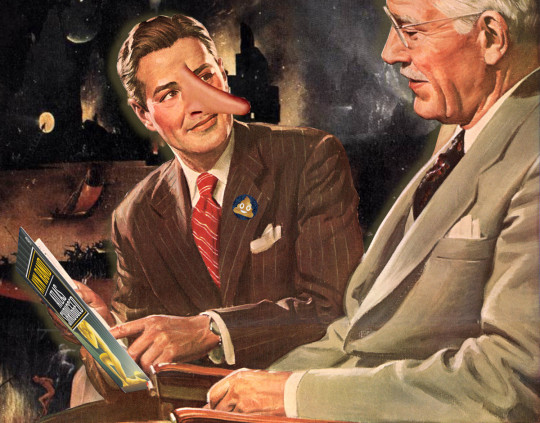
Next Tuesday (Oct 31) at 10hPT, the Internet Archive is livestreaming my presentation on my recent book, The Internet Con.

There are six lies that corporations have told since time immemorial, and Nick Hanauer, Joan Walsh and Donald Cohen's new book Corporate Bullsht: Exposing the Lies and Half-Truths That Protect Profit, Power, and Wealth in America* provides an essential taxonomy of this dirty six:
https://thenewpress.com/books/corporate-bullsht
In his review for The American Prospect, David Dayen summarizes how these six lies "offer a civic-minded, reasonable-sounding justification for positions that in fact are motivated entirely by self-interest":
https://prospect.org/culture/books/2023-10-27-lies-my-corporation-told-me-hanauer-walsh-cohen-review/
I. Pure denial
As far back as the slave trade, corporate apologists and mouthpieces have led by asserting that true things are false, and vice-versa. In 1837, John Calhoun asserted that "Never before has the black race of Central Africa, from the dawn of history to the present day, attained a condition so civilized and so improved, not only physically, but morally and intellectually." George Fitzhugh called enslaved Africans in America "the freest people in the world."
This tactic never went away. Children sent to work in factories are "perfectly happy." Polluted water is "purer than the water that came from the river before we used it." Poor families "don't really exist." Pesticides don't lead to "illness or death." Climate change is "beneficial." Lead "helps guard your health."
II. Markets can solve problems, governments can't
Alan Greenspan made a career out of blithely asserting that markets self-correct. It was only after the world economy imploded in 2008 that he admitted that his doctrine had a "flaw":
https://www.pbs.org/newshour/show/greenspan-admits-flaw-to-congress-predicts-more-economic-problems
No matter how serious a problem is, the market will fix it. In 1973, the US Chamber of Commerce railed against safety regulations, because "safety is good business," and could be left to the market. If unsafe products persist in the market, it's because consumers choose to trade safety off "for a lower price tag" (Chamber spox Laurence Kraus). Racism can't be corrected with anti-discrimination laws. It's only when "the market" realizes that racism is bad for business that it will finally be abolished.
III. Consumers and workers are to blame
In 1946, the National Coal Association blamed rampant deaths and maimings in the country's coal-mines on "carelessness on the part of men." In 2003, the National Restaurant Association sang the same tune, condemning nutritional labels because "there are not good or bad foods. There are good and bad diets." Reagan's interior secretary Donald Hodel counseled personal responsibility to address a thinning ozone layer: "people who don’t stand out in the sun—it doesn’t affect them."
IV. Government cures are always worse than the disease
Lee Iacocca called 1970's Clean Air Act "a threat to the entire American economy and to every person in America." Every labor and consumer protection before and since has been damned as a plague on American jobs and prosperity. The incentive to work can't survive Social Security, welfare or unemployment insurance. Minimum wages kill jobs, etc etc.
V. Helping people only hurts them
Medicare will "destroy private initiative for our aged to protect themselves with insurance" (Republican Senator Milward Simpson, 1965). Covid relief is unfair to people that are currently in the workforce" (Republican Governor Brian Kemp, 2021). Welfare produces "learned helplessness."
VI. Everyone who disagrees with me is a socialist
Grover Cleveland's 2% on top incomes is "communistic warfare against rights of property" (NY Tribune, 1895). "Socialized medicine" will leave "our children and our children’s children [asking] what it once was like in America when men were free" (Reagan, 1961).
Everything is "socialism": anti-child labor laws, Social Security, minimum wages, family and medical leave. Even fascism is socialism! In 1938, the National Association of Manufacturers called labor rights "communism, bolshevism, fascism, and Nazism."
As Dayen says, it's refreshing to see how the right hasn't had an original idea in 150 years, and simply relies on repeating the same nonsense with minor updates. Right wing ideological innovation consists of finding new ways to say, "actually, your boss is right."
The left's great curse is object permanence: the ability to remember things, like the fact that it used to be possible for a worker to support a family of five on a single income, or that the economy once experienced decades of growth with a 90%+ top rate of income tax (other things the left manages to remember: the "intelligence community" are sociopathic monsters, not Trump-slaying heroes).
When the business lobby rails against long-overdue antitrust action against Amazon and Google, object permanence puts it all in perspective. The talking points about this being job-destroying socialism are the same warmed-over nonsense used to defend rail-barons and Rockefeller. "If you don't like it, shop elsewhere," has been the corporate apologist's line since slavery times.
As Dayen says, Corporate Bullshit is a "reference book for conservative debating points, in an attempt to rob them of their rhetorical power." It will be out on Halloween:
https://bookshop.org/a/54985/9781620977514

If you'd like an essay-formatted version of this post to read or share, here's a link to it on pluralistic.net, my surveillance-free, ad-free, tracker-free blog:
https://pluralistic.net/2023/10/27/six-sells/#youre-holding-it-wrong
#pluralistic#corporate bullshit#lies#books#reviews#taxonomies#labor#denialism#consumerism#Nick Hanauer#Joan Walsh#Donald Cohen#history#object permanence#taking the right seriously
833 notes
·
View notes
Video
youtube
How the Corporate Takeover of American Politics Began
The corporate takeover of American politics started with a man and a memo you've probably never heard of.
In 1971, the U.S. Chamber of Commerce asked Lewis Powell, a corporate attorney who would go on to become a Supreme Court justice, to draft a memo on the state of the country.
Powell’s memo argued that the American economic system was “under broad attack” from consumer, labor, and environmental groups.
In reality, these groups were doing nothing more than enforcing the implicit social contract that had emerged at the end of the Second World War. They wanted to ensure corporations were responsive to all their stakeholders — workers, consumers, and the environment — not just their shareholders.
But Powell and the Chamber saw it differently. In his memo, Powell urged businesses to mobilize for political combat, and stressed that the critical ingredients for success were joint organizing and funding.
The Chamber distributed the memo to leading CEOs, large businesses, and trade associations — hoping to persuade them that Big Business could dominate American politics in ways not seen since the Gilded Age.
It worked.
The Chamber’s call for a business crusade birthed a new corporate-political industry practically overnight. Tens of thousands of corporate lobbyists and political operatives descended on Washington and state capitals across the country.
I should know — I saw it happen with my own eyes.
In 1976, I worked at the Federal Trade Commission. Jimmy Carter had appointed consumer advocates to battle big corporations that for years had been deluding or injuring consumers.
Yet almost everything we initiated at the FTC was met by unexpectedly fierce political resistance from Congress. At one point, when we began examining advertising directed at children, Congress stopped funding the agency altogether, shutting it down for weeks.
I was dumbfounded. What had happened?
In three words, The Powell Memo.
Lobbyists and their allies in Congress, and eventually the Reagan administration, worked to defang agencies like the FTC — and to staff them with officials who would overlook corporate misbehavior.
Their influence led the FTC to stop seriously enforcing antitrust laws — among other things — allowing massive corporations to merge and concentrate their power even further.
Washington was transformed from a sleepy government town into a glittering center of corporate America — replete with elegant office buildings, fancy restaurants, and five-star hotels.
Meanwhile, Justice Lewis Powell used the Court to chip away at restrictions on corporate power in politics. His opinions in the 1970s and 80s laid the foundation for corporations to claim free speech rights in the form of financial contributions to political campaigns.
Put another way — without Lewis Powell, there would probably be no Citizens United — the case that threw out limits on corporate campaign spending as a violation of the “free speech” of corporations.
These actions have transformed our political system. Corporate money supports platoons of lawyers, often outgunning any state or federal attorneys who dare to stand in their way. Lobbying has become a $3.7 billion dollar industry.
Corporations regularly outspend labor unions and public interest groups during election years. And too many politicians in Washington represent the interests of corporations — not their constituents. As a result, corporate taxes have been cut, loopholes widened, and regulations gutted.
Corporate consolidation has also given companies unprecedented market power, allowing them to raise prices on everything from baby formula to gasoline. Their profits have jumped into the stratosphere — the highest in 70 years.
But despite the success of the Powell Memo, Big Business has not yet won. The people are beginning to fight back.
First, antitrust is making a comeback. Both at the Federal Trade Commission and the Justice Department we’re seeing a new willingness to take on corporate power.
Second, working people are standing up. Across the country workers are unionizing at a faster rate than we’ve seen in decades — including at some of the biggest corporations in the world — and they’re winning.
Third, campaign finance reform is within reach. Millions of Americans are intent on limiting corporate money in politics – and politicians are starting to listen.
All of these tell me that now is our best opportunity in decades to take on corporate power — at the ballot box, in the workplace, and in Washington.
Let’s get it done.
#youtube#videos#video#powell memo#corporations#wall street#finance#corruption#politics#lobbying#government
1K notes
·
View notes
Text
Carl Grant, a Vietnam veteran with dementia, wandered out of a hospital room to charge a cellphone he imagined he had. When he wouldn’t sit still, the police officer escorting Grant body-slammed him, ricocheting the patient’s head off the floor.
Taylor Ware, a former Marine and aspiring college student, walked the grassy grounds of an interstate rest stop trying to shake the voices in his head. After Ware ran from an officer, he was attacked by a police dog, jolted by a stun gun, pinned on the ground and injected with a sedative.
And Donald Ivy Jr., a former three-sport athlete, left an ATM alone one night when officers sized him up as suspicious and tried to detain him. Ivy took off, and police tackled and shocked him with a stun gun, belted him with batons and held him facedown.
Each man was unarmed. Each was not a threat to public safety. And despite that, each died after police used a kind of force that is not supposed to be deadly — and can be much easier to hide than the blast of an officer’s gun.
...
Over a decade, more than 1,000 people died after police subdued them through means not intended to be lethal, an investigation led by The Associated Press found....
These sorts of deadly encounters happened just about everywhere, according to an analysis of a database AP created. Big cities, suburbs and rural America. Red states and blue states. Restaurants, assisted-living centers and, most commonly, in or near the homes of those who died. The deceased came from all walks of life — a poet, a nurse, a saxophone player in a mariachi band, a truck driver, a sales director, a rodeo clown and even a few off-duty law enforcement officers.
The toll, however, disproportionately fell on Black Americans like Grant and Ivy. Black people made up a third of those who died despite representing only 12% of the U.S. population. Others feeling the brunt were impaired by a medical, mental health or drug emergency, a group particularly susceptible to force even when lightly applied.
...
Reporters filed nearly 7,000 requests for government documents and body-camera footage, receiving more than 700 autopsy reports or death certificates, and uncovering video in at least four dozen cases that has never been published or widely distributed.
Medical officials cited law enforcement as causing or contributing to about half of the deaths. In many others, significant police force went unmentioned and drugs or preexisting health conditions were blamed instead.
Video in a few dozen cases showed some officers mocked people as they died, laughing or making comments such as “sweaty little hog,” “screaming like a little girl” and “lazy f---.” In other cases, officers expressed clear concern for the people they were subduing.
41 notes
·
View notes
Text
MOCCA Arts Festival

Announcing the 2023 MoCCA Arts Festival Featured Guests
The Society of Illustrators is proud to share a list of Featured Guests who will appear at the MoCCA Arts Festival, taking place April 1 - 2, 2023 from 11:00AM - 7:00PM on Saturday and 11:00AM - 6:00PM on Sunday. The Exhibitor Hall will be held at Met Pavilion, a spacious venue nestled in the heart of the Chelsea neighborhood, and is within walking distance to many great restaurants and attractions. Programming will be a few steps away at the SVA Flatiron Gallery, located at 133 West 21st Street.
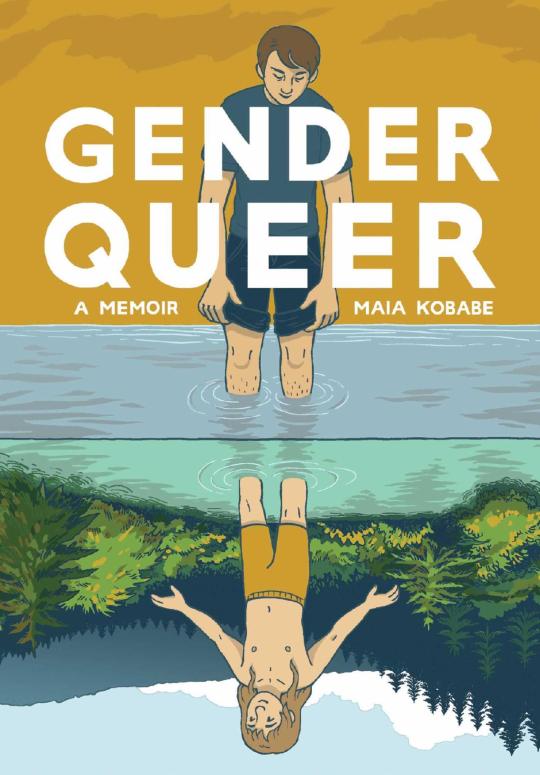
Maia Kobabe is the author of Gender Queer (Oni Press), a critically acclaimed Young Adult graphic memoir that has also been named a Stonewall Honor book. Gender Queer was also ranked by the American Library Association as the most frequently banned or challenged book in the United States in 2021. Kobabe will talk about eir work in a special spotlight session moderated by Michele Kirichanskaya and will also participate in a panel on comics and censorship hosted by PEN America’s Jonathan Friedman.

In her career, Colleen Doran has written and drawn the long-running creator-owned series A Distant Soil and has worked on titles including Wonder Woman, Amazing Spider-Man, and many others. Her body of work includes a series of collaborations with writer Neil Gaiman which are the subject of the exhibit “Colleen Doran Illustrates Neil Gaiman,” running from March 22nd to July 29th at the Society of Illustrators. She will appear in conversation with Gaiman to discuss their comics collaborations and her overall body of work in a special programming event moderated by exhibition curator Kim Munson.

Barbara Brandon-Croft became the first Black woman to write and draw a nationally syndicated comic strip when Where I’m Coming From debuted in American newspapers in 1991. Featuring a cast of nine women of color commenting insightfully on current events, her groundbreaking comic strip has now been anthologized in a book edition from Drawn and Quarterly. Brandon-Croft will talk about her trailblazing work in a special spotlight session.
Other featured artists at this year’s festival will include:
Kim Deitch, a pioneering underground comix artist who began publishing comics in the East Village Other in 1967 and whose most recent graphic novel, Reincarnation Stories (Fantagraphics) was published to critical acclaim in 2019.
Drew Friedman, whose most recent book of portraiture, Maverix and Lunatix (Fantagraphics), celebrates the artists of the underground comix generation
Miriam Katin, whose out-of-print graphic memoir of escaping the Holocaust as a child refugee accompanied by her mother, We Are On Our Own (Drawn & Quarterly), will be republished in a forthcoming paperback edition.
Toma Vagner, the award-winning illustrator who designed this year’s MoCCA key image and has produced striking graphics for clients including Harry Styles, Google, The New York Times, Bloomberg, and The New Yorker.
Noah Van Sciver, whose body of graphic novels includes Joseph Smith and the Mormons (Abrams ComicArts), Fante Bukowski (Fantagraphics Books), and the forthcoming comic book series Maple Terrace (Uncivilized Books).
These and other Featured Artists will participate in programming and signings, schedules for which will be announced in the coming days and weeks. A full list of exhibiting artists can be found on the MoCCA Arts website.
About the Museum of Illustration at the Society of Illustrators and the MoCCA Arts Festival
Founded in 1901, the Society of Illustrators and its Museum of Illustration together comprise America’s longest-standing nonprofit organization dedicated to the art of illustration. The mission of SI/MI is to promote the art and appreciation of illustration and its history and evolving nature through exhibitions and educational programs.
The MoCCA Arts Festival is a 2-day multimedia event, Manhattan’s largest independent comics and cartoon festival, drawing over 7,000 attendees each year. With over 500 exhibiting artists displaying their work, award-winning honorees speaking about their careers and artistic processes and other featured artists conducting demos, lectures and panels, our Festival mission accelerates the advancement of the Society’s broader mission to serve as Manhattan’s singular cultural institution promoting all genres of illustration through exhibitions, programs and art education.
The Society will continue to release additional information about the Fest in the near future. Tickets are available to purchase online as well as at the door. The Society is following all state and city safety protocols. Protocols are subject to change, so be sure to check back for the latest information. As of now, face coverings are optional at Metropolitan Pavilion and the Exhibitor Hall. Proof of vaccines, boosters and masks are required to enter SVA buildings and programming.
To learn more about the Fest, please visit the website.
For media inquiries please contact:
Kate Feirtag
Director of Communications and External Relations
#exhibits#personal appearance#neilgaiman#neil gaiman#MOCCA#maia kobabe#drew friedman#society of illustrators
393 notes
·
View notes
Note
Hi! I'm a longtime kaylor lurker, but I saw you and your anons were trying to think through the reason for this Travis Kelce push and I thought I'd share some perspective as an American who's not exactly a football fan per se, but is from an area of the country where football is very popular so I'm kind of an ambient fan by default. I'm very sorry this got a little long, but I do think there are some really interesting dynamics at play here, but the tldr; is - broad appeal for the American premiere and politics.
There are some optics about Travis Kelce that are I think getting lost in the NFL-to-Swiftie translation that may be important. He's a famous football player, yes, but NFL fans skew heavily towards older men in non-urban areas, which also means NFL fans skew conservative. Travis Kelce promoted Bud Light when transphobes in America were boycotting the brand, and is also partnering with Pfizer for a public health campaign to promote the COVID-19 vaccine, which is very controversial for American conservatives. He's also known as a very stylish man (which is weird to say but is pretty uncommon among American athletes, especially white ones, and he's well-known for it) and before Taylor, all of his known/rumored exes have been Black or mixed (I could write an essay on the racial dynamics alone of this weekend, but... suffice it to say it's there and messy). I'd also heard rumors that he was closeted before he got together with Taylor, but I never really looked into them that deeply so I don't know how true they are, or whether they arose just because he dresses well and doesn't usually date white women (sad but true that for a portion of Americans, that would be enough to make them doubt his masculinity and therefore heterosexuality). Which kind of gets to my point - before this, a lot of the more conservative wing of NFL fans saw Travis Kelce as controversial, "beta", not sufficiently manly, despite the fact he is a champion football player. I know all of this sounds a little insane, please remember that these are the people electing Donald Trump and going after drag shows and banning books with LGBTQ+ people in them.
So, with that slightly more nuanced image of Travis Kelce, I think that makes the clearest takeaway from this weekend, at least for me, how extremely traditional all-American it was. Football player, blonde girl cheering in the stands with his mom, driving off in his convertible after the game, them making a point to correct the initial reporting that she had paid for people's meals so that he's the one renting out the restaurant for her. To be clear, this isn't really how Travis Kelce is normally seen, and already I've seen some hit tweets with people dunking on conservatives criticizing Kelce for being insufficiently manly by responding something along the lines of "uh, he won the Super Bowl and bagged the world's most famous pop star, I think he's doing okay" - so, reading between the lines, he's performed (specifically) white masculinity very successfully. And for Taylor, too, I think we've already seen a lot of people saying how she's finally with a "real man" - he's very tall, he's very athletic, he's American, I think a lot of the joking anti-Joe "he's got a real job" comments fall into this bucket as well. She is performing white American womanhood in a very specific way, a large part of which is that she's being framed as not the 'dominant' partner in the relationship in the way she was in her relationship with Joe (by virtue of their differences in wealth and success).
So I think this is re-orienting both of their images into a new, very traditional, Americana-inspired direction. I don't think this is a market Taylor has really gone after maybe since she moved into pop in the first place, but especially not in recent years, when she swung very hard into a much more urban liberal niche (basing herself more out of NYC and London than Nashville, associating herself musically and socially with people like the Haim sisters, Phoebe Bridgers, MUNA).
I don't think we can know exactly why she's leaning this direction yet, but if I had to guess it's more about the American documentary premiere. In Hollywood, typically for the biggest box office impact you want a "four-quadrant movie" - one that appeals to the four biggest demographic quadrants (male/female and under 25/over 25). Taylor Swift's fanbase skews female and young, with a solid presence over 25 as well, and like I said earlier, the NFL's fanbase skews male and over 25. I don't think showing up to a football game will make a bunch of NFL fans suddenly want to see her documentary on opening night, but it may make them more inclined to go see it with their girlfriends, wives, or daughters a few days later, instead of staying at home, and that would have a very big box office impact.
I also think she *might* be looking at the political optics, and wanting to not only move on from MH but also put herself in a kind of solidly centrist-liberal place (she likes good ol' American football but also the vaccine! she votes Dem but she's not one of those New York liberal elites, she eats chicken tenders with seemingly ranch! - truly seems like this is a couple tailor-made (or maybe Taylor-made ;) ) to appeal to swing voters), which I think is very much where she tried to position herself with Miss Americana as well and which seems relevant given her voter registration push recently and as we move into an election year. I'll be very interested to see if she does anything further politically, or says anything about politics in her documentary again. Between her voter registration effort and his Pfizer partnership and the timing of both, politics is actually the angle I'd bet on driving this.
hi! thank you for sharing these thoughts, it provides more context for everything! i do think it shapes her persona in the public eye, and it’s interesting to think how that might benefit her in ways other than a profit motivation
55 notes
·
View notes